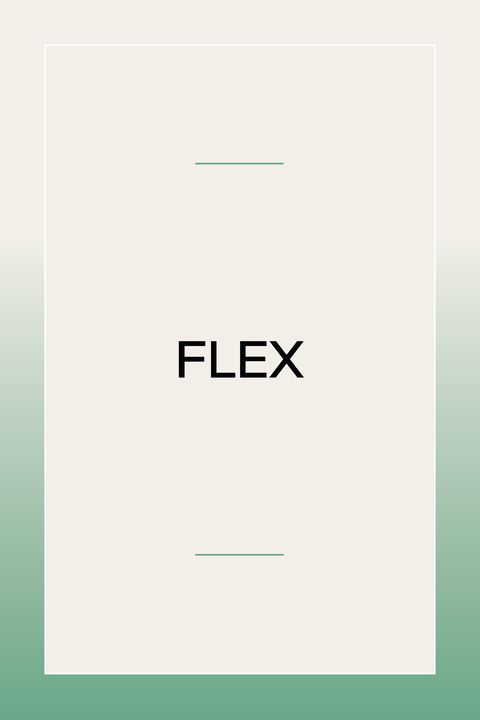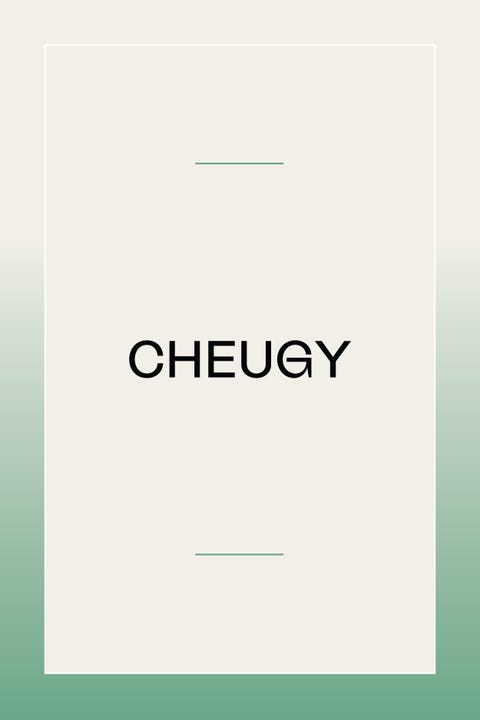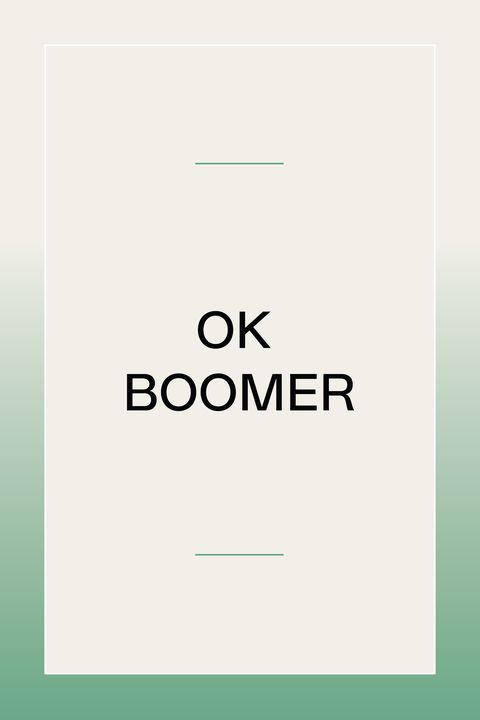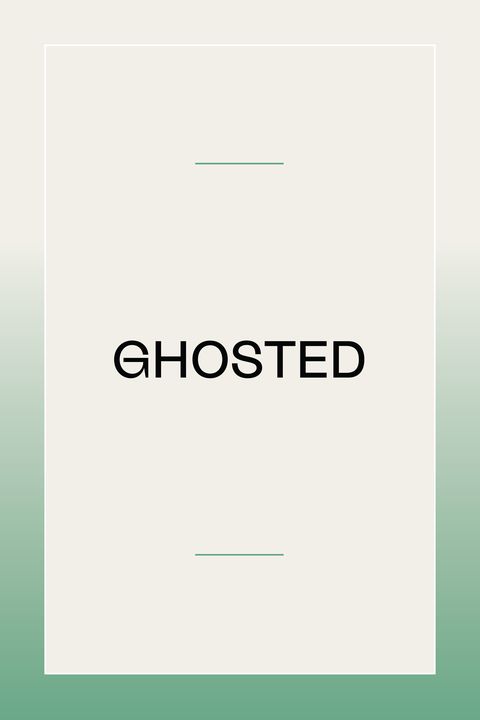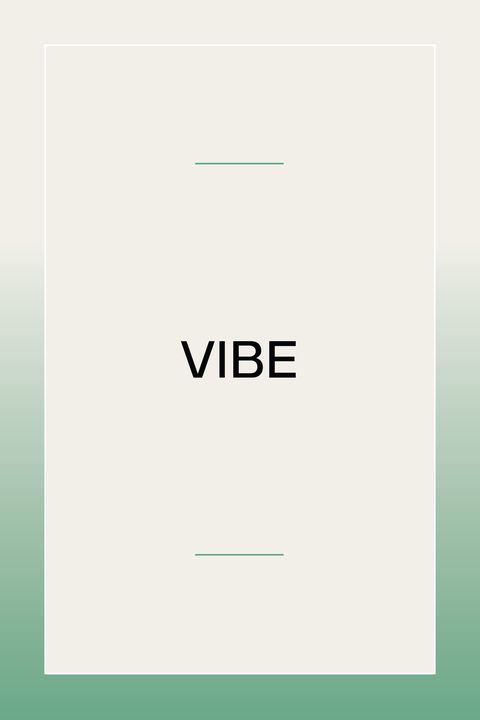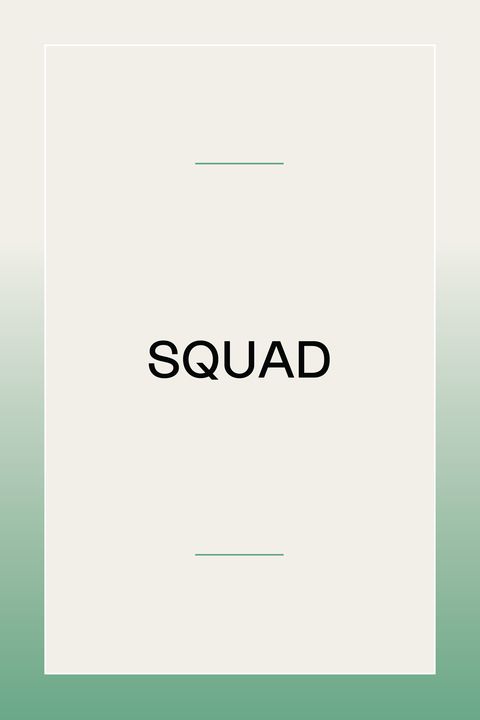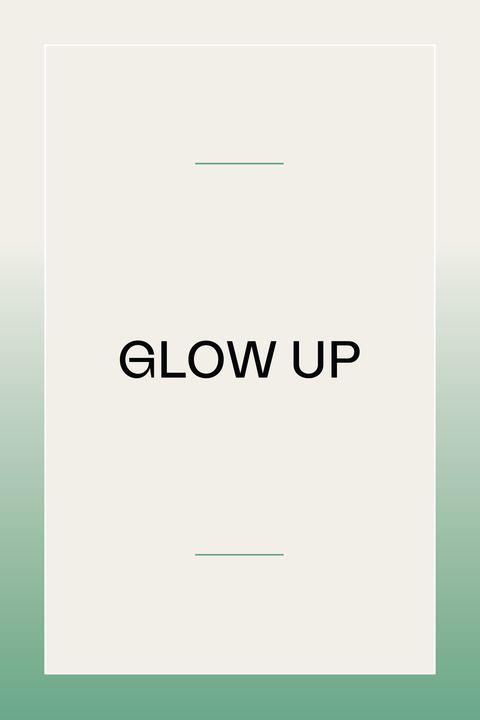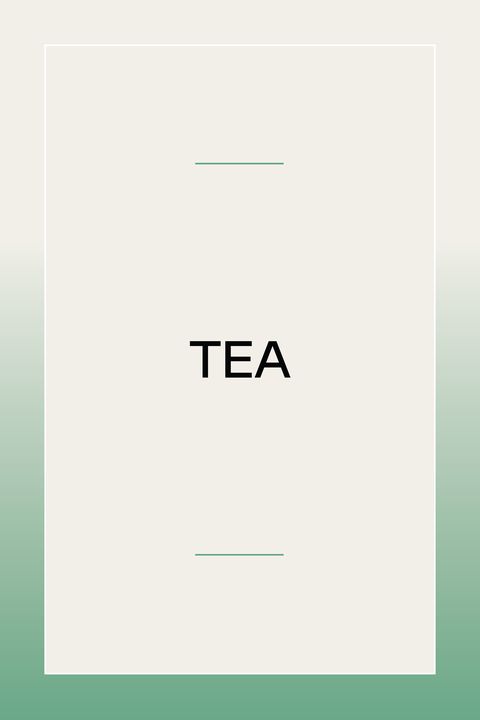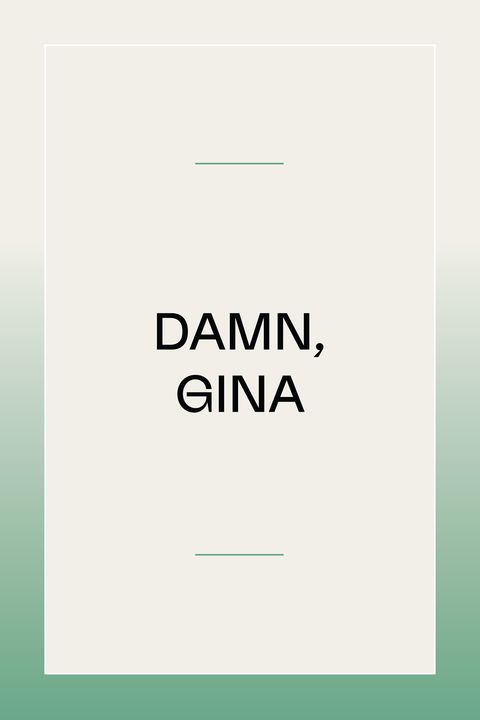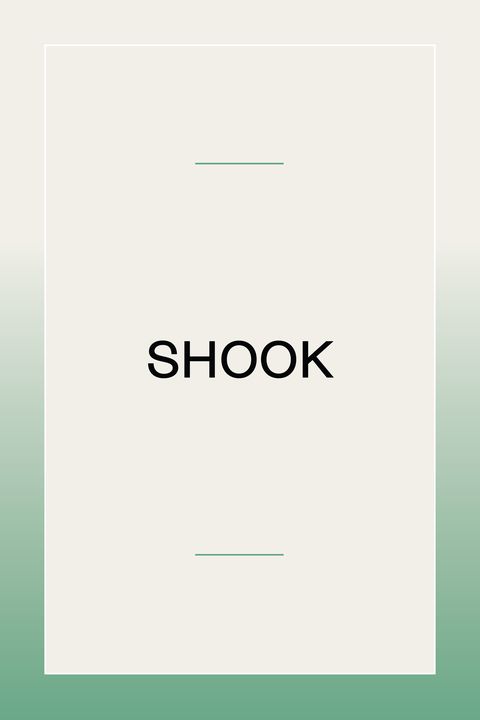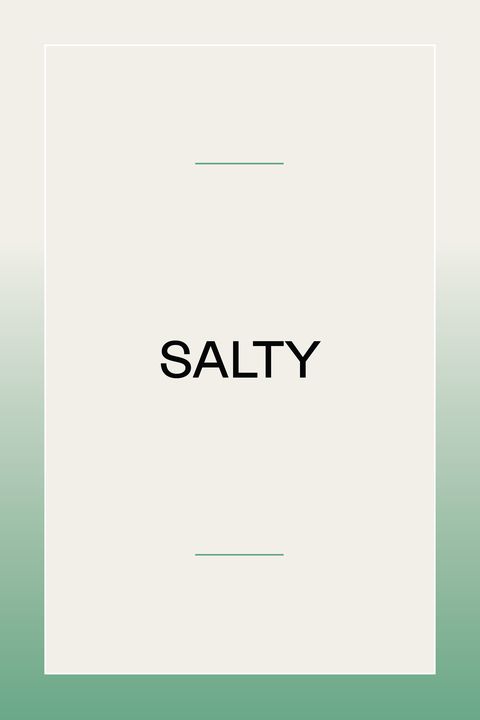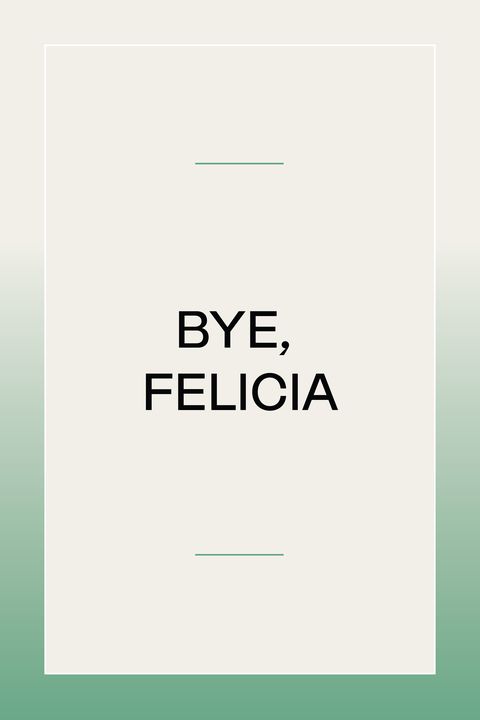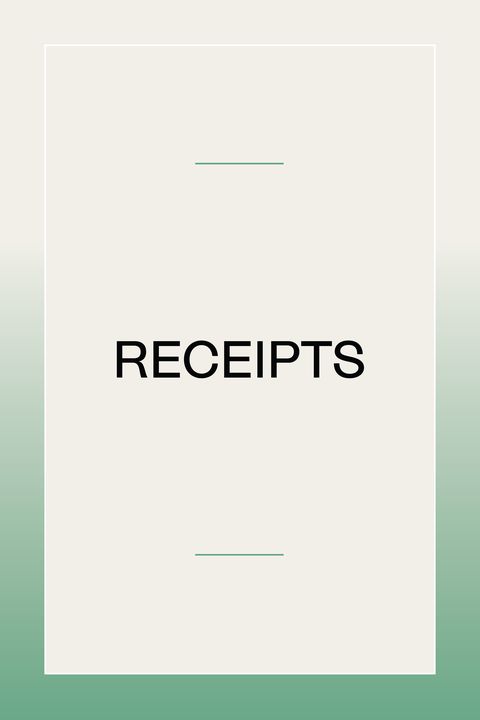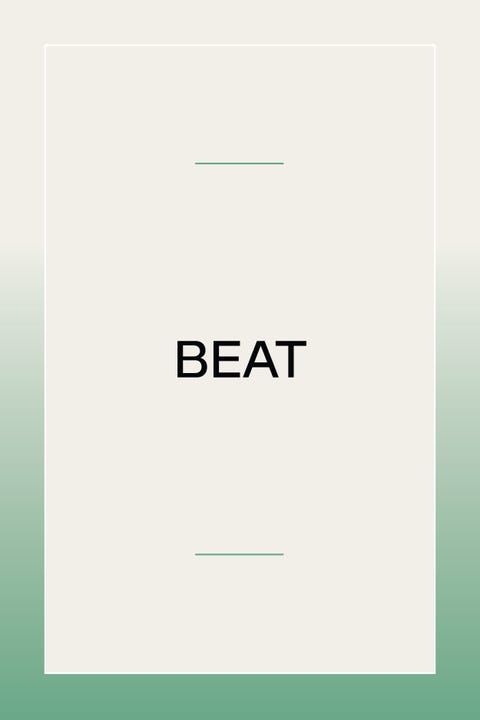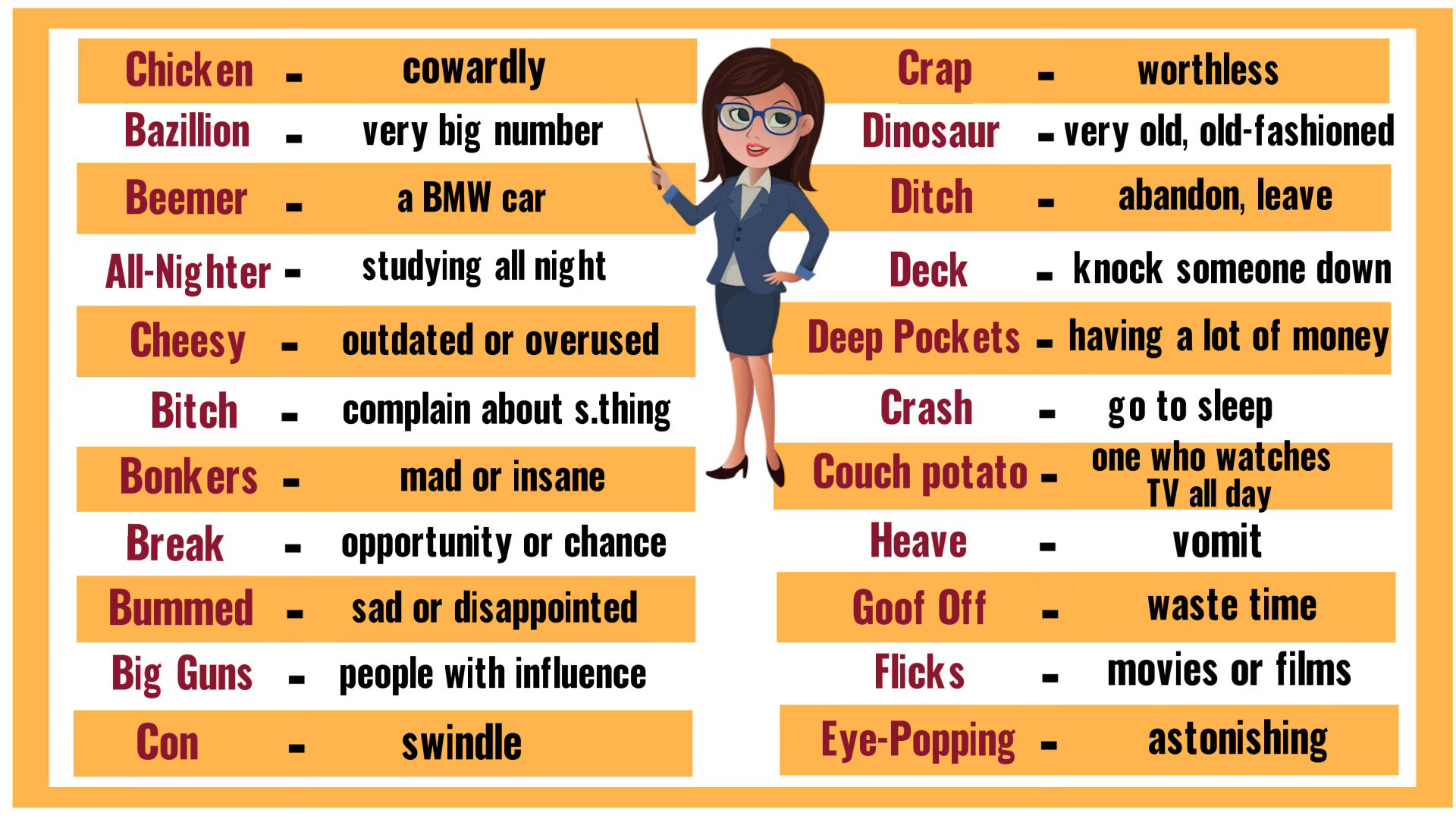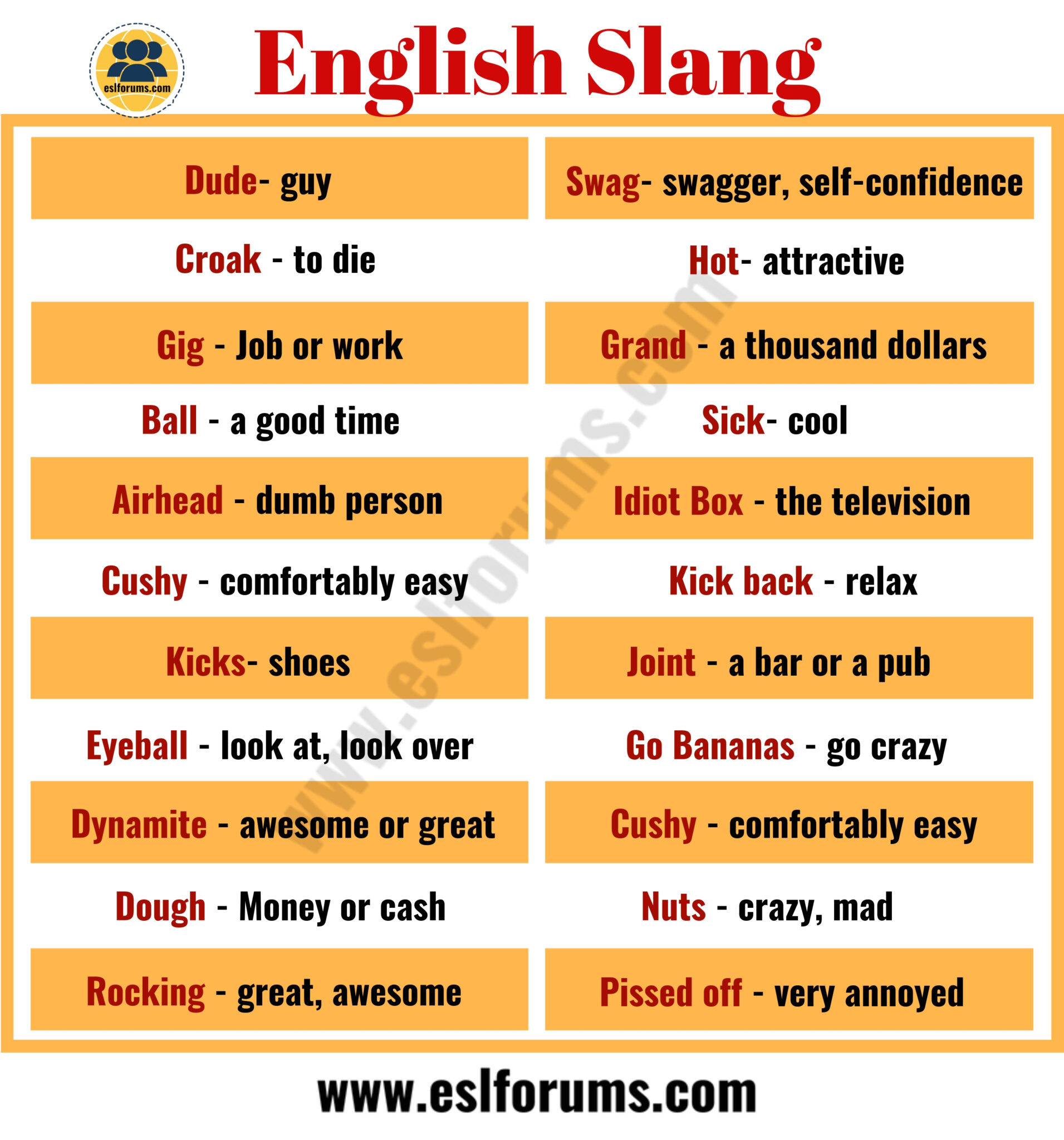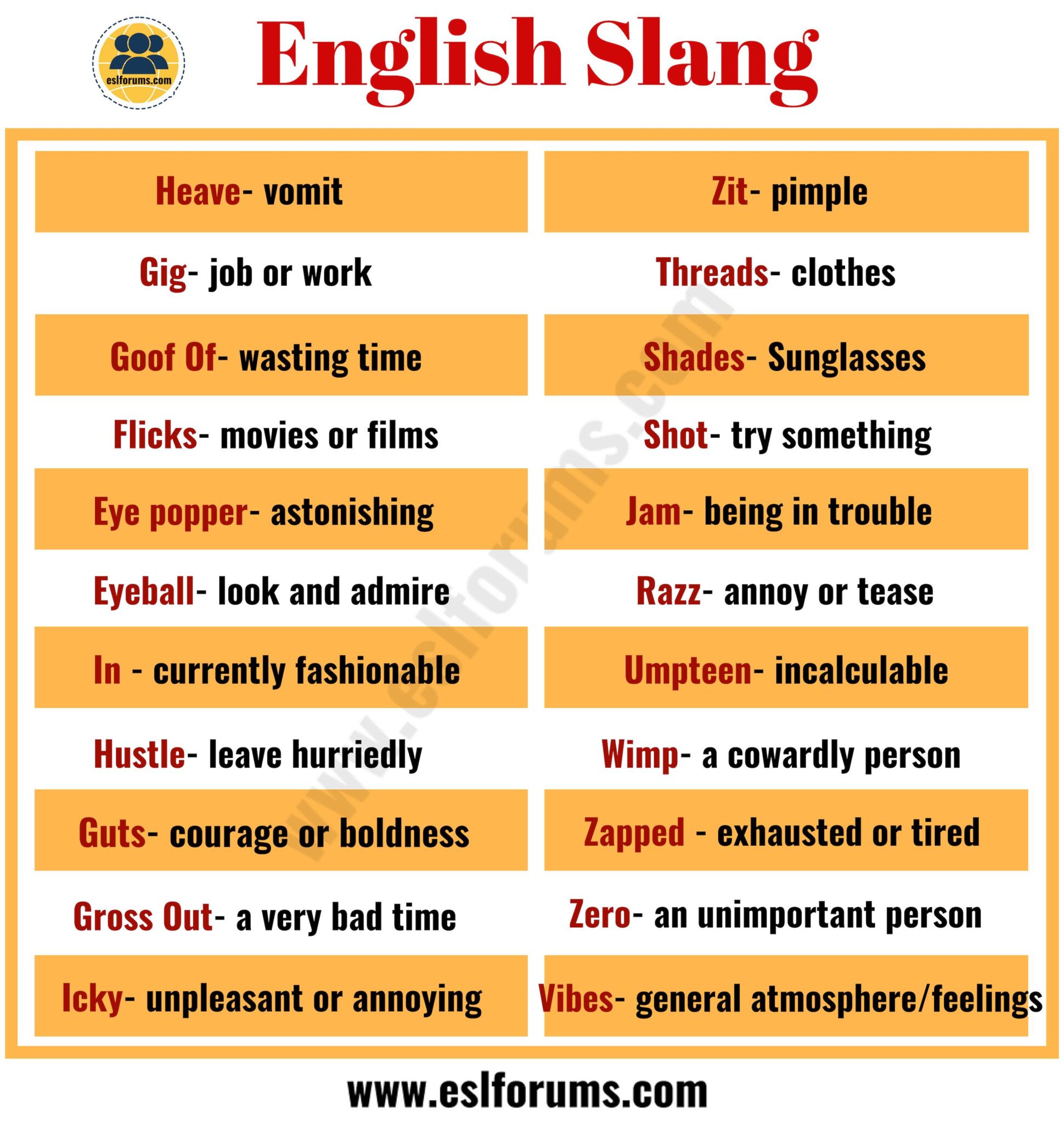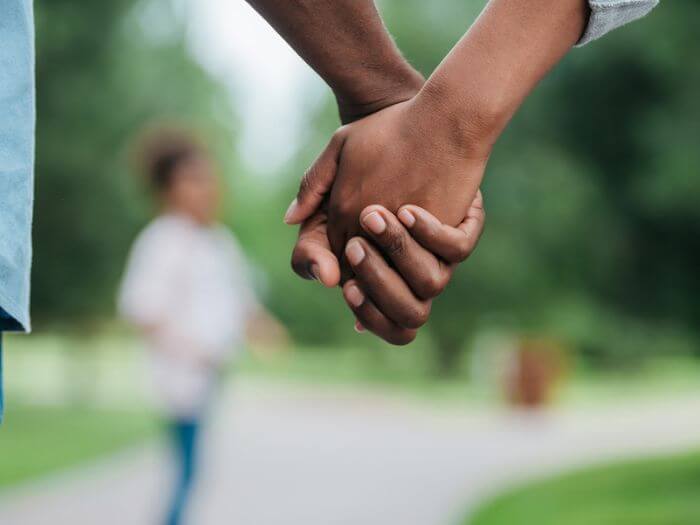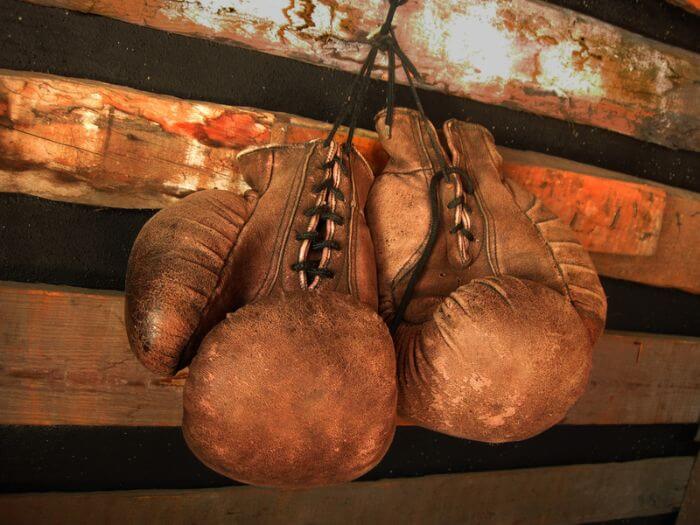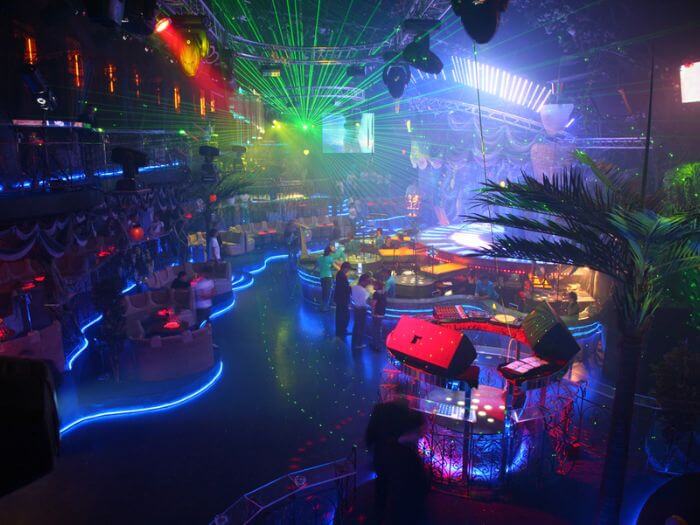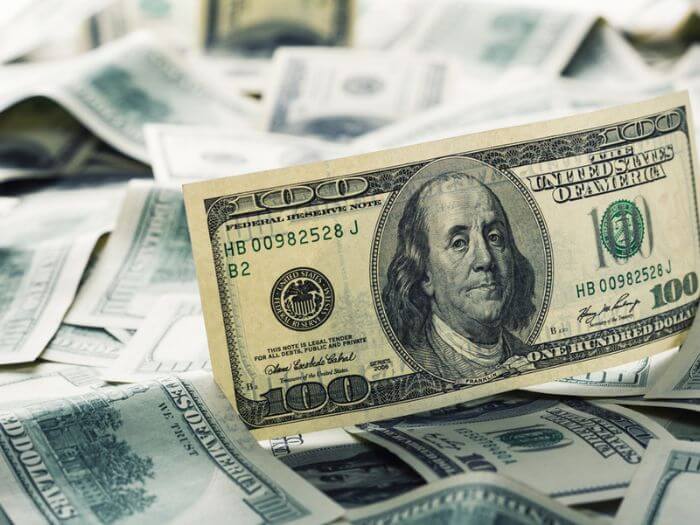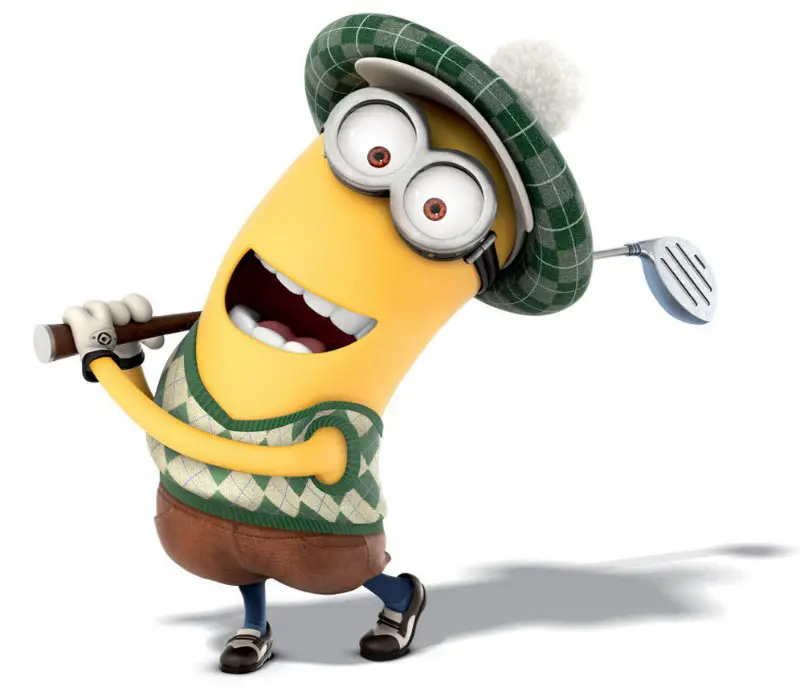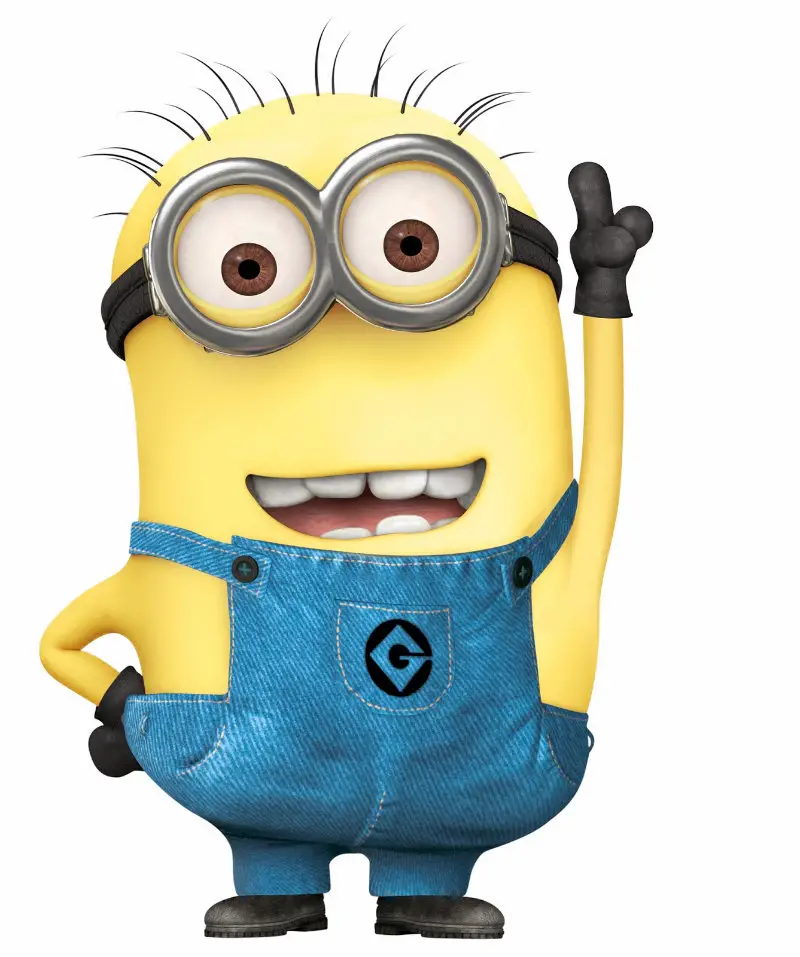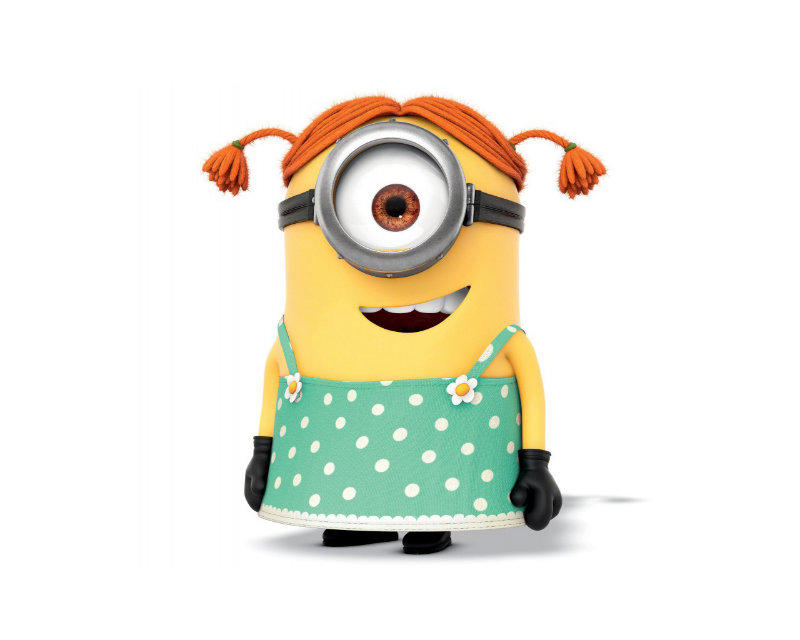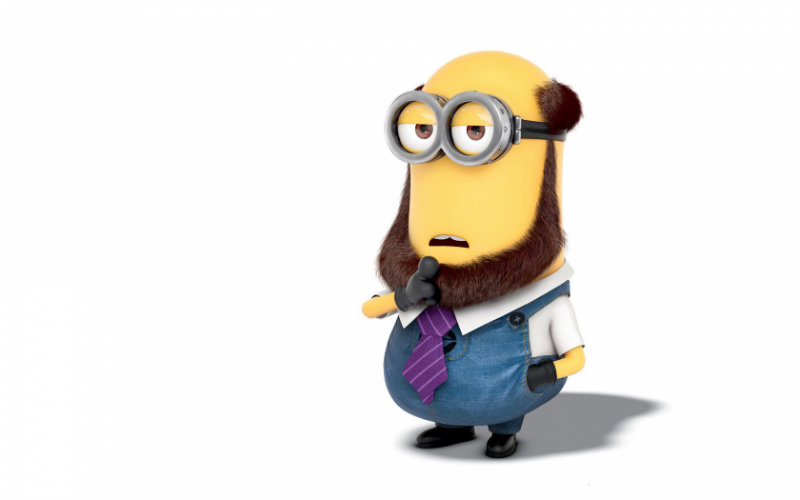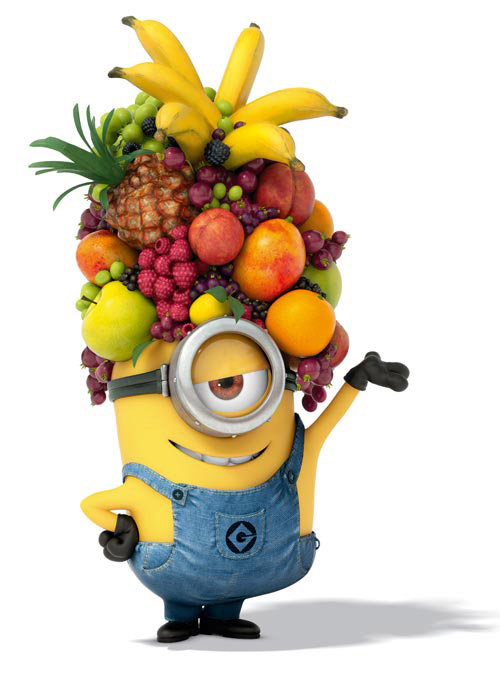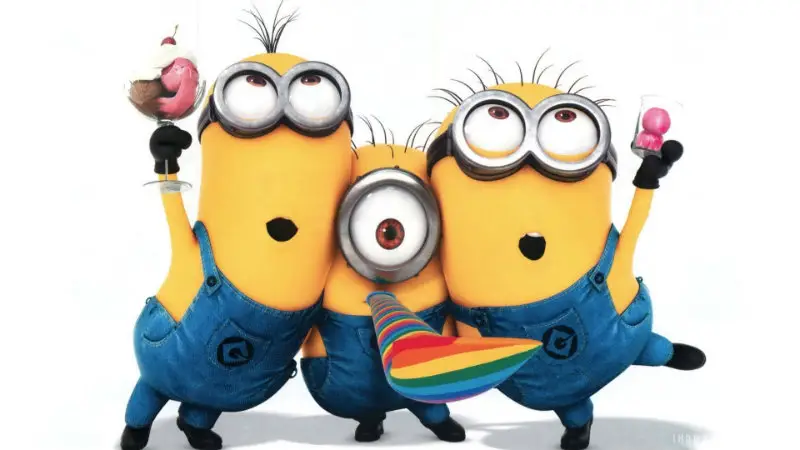One of the developments which must certainly be credited to the nineteenth century is the growth of an objective and scientific attitude towards slang which has become one of the most prominent features of the English language.
Slang is very informal language that consists of words and phrases basically used in speech rather than writing and restricted in a specific region or a particular group of people.
Slang Definition
Slang has been defined by Greenough and Kittredge as
“a peculiar kind of vagabond language, always hanging on the outskirts of legitimate speech, but continually straying or forcing its way into the most respectable company.”
The Oxford English Dictionary defines slang as the
“language of a highly colloquial type, below the level of standard educated speech, and consisting cither of new words or of current words employed in some special sense.”
The following definition given by H. W. Fowler in his Modern English Usage, though inadequate by itself, is complementary to that of the Oxford Dictionary:
“the diction that results from the favourite game among the young and lively of playing with words and renaming things and actions.”
Origin of Slang
Slang has its root in topicality, convenience and elementary human nature. It originates and flourishes best in unconventionality. “Among the impulses which lead to the invention of slang”, Dr. H. Bradley says. “the two most important seem to be the desire to secure increased vivacity and the desire to secure increased sense of intimacy in the use of language.”
The conditions favouring the origin of slang is crowding and excitement As Camden Hotten has said, “Any sudden excitement or peculiar circumstance is quite sufficient to originate and set going a score of slang words.” Slang is as characteristic of the individual as of the clique, the profession, the trade and the class. In the opinion of Greenough and Kittredge the coinage and circulation of slang come from the desire of the individual to distinguish himself by oddity and grotesque humour. Another potent force that makes for slang is the impatience with existing words and phrases- the desire to escape from the restraints imposed by a formal standard. The man in the street considers the expression to dismiss tame and colourless, and so he substitutes “to give one the air”. For the same reason a young woman who fails to keep an engagement with a youngman stands him up. The desire to be novel and striking thus has much to do with the origin of slang. Again the desire to be secret and not to be understood by others around the slang-user has given birth to many slang. Students, very close friends, lovers, members of secret political societies, persons in prisons use slang with this end in view.
Slang is personal in its origin. It is the user who determines the matter and meaning of slang. And slang is devised by persons belonging to the different walks of life by persons of wit and ingenuity, stockbroker, scholar, labourer, lawyer, soldier, sailor, the man in the street, and the man in the car. Whatever the origin of slang, personality and environment are the two most powerful determinants of the nature of slang.
Uses of Slang
Slang, has some good uses. It enriches the language. It invests the abstract with solidity and concreteness, and the remote with nearness and immediacy It terrestrializes the ethereal, and brings down the idealistic to the materialistic level. But the greatest use of slang is in its euphemistic effect. There are many slangy expressions which mitigate the tragedy lightens the inevitability of death and prettifies folly or drunkenness. Among the euphemistic slang may be mentioned “make esay” (to kill), “step into a last bus” (to die), “hop the bags” (to attack the enemy across no man’s land), “in Adam and Eve’s togs” (naked), “excuse my French” (forgive me my strong language) etc.
Slang is sometimes used to amuse a superior and place self on an emotional and mental level with one’s audience. On many occasions a man has recourse to it to make known and even to assert that he belongs or has belonged to a certain school or collages or university, a certain trade or profession, an artistic or intellectual group of social class. In other words, he uses it in order to be in the swim” and establish contact. Slang is also employed to disperse or lessen the solemnity or excessive of gravity of conversation or the pomposity of a piece of writing.
Characteristics of Slang
The most important characteristic of slang is its tendency to rise in the verbal world, and thus to become ennobled. H.T. Buckle has very humorously said, “Many of these (slang) words and phrases are but serving their apprenticeship, and will eventually become the active strength of our language.” The slang of one generation has often become the literary language of the next. Many of the English idioms have come from slang, for “idiom is”, as John Brophy says, “fed by the tested inventions of slang”.
Among the slang phrases that have risen in status are “at fault” (from a dog’s losing the scent), “to start in” (to begin), “on the stocks” (in preparation), to peter out, down to bed rock, it is up to you to be in at the death, below the belt, mass play, knock-out blow etc.
Another distinctive characteristic of slang is its ephemerality. Since novelty is a quality which soon wears off, slang which derives its life from novelty has to be constantly renewed. Like man, its creator, slang comes and goes.
“Vamoose, skiddoo, twenty three and beat it give place to scram! which will certainly be forgotten when a newer expression catches the popular fancy.” (A.C. Baugh).
Also Read:
- Theories of the Origin of Language
The third characteristic of slang is its synonymous abundance, and the ideas and facts which are most fertile in synonyms are money, drinking, drunkenness, the sexual organs and the sexual act. In The Slang Dictionary Hotten lists 130 synonyms for money. He gives drink the next place and intoxication the third place. “But the tabooed words of standard English”, says E. Patridge, “are hardly less productive of slang synonyms: because of the need for euphemism, or of a desire to give them a different appearance and complexion, these taboos result in synonyms more ingenious, and many of them, more picturesque than those for money and drink.”
Slang in relation to legitimate speech
Slang hangs on the outskirts of the legitimate speech and some slang words manage, now and then, to find their way into legitimate speech. Thus we use now naturally, and with entire propriety, many slang words which were regarded as linguistically untouchable by writers of a generation or few generations ago. The expression “what on earth” seems to us an idiomatic expression and certainly will not be objected to in the speech of anyone today. But De Quincey condemned its use and was horrified at hearing it used by a government official. The word “row” in the sense of disturbance or commotion was considered slang in the eighteenth century and Todd (1818) described it as a very low expression, but to-day the word is used in this sense in the works of many reputed authors. So “to parry a thrust”, “o fence” (in an argument)”. “to cross swords with the opposing counsel”. “to bandy words”, “to wrestle with a problem”. “to trip one up” (in a discussion), “lo lose track of a subject”, “to run counter”, “to hit or miss the mark” are now all good English expressions, though most of them were formerly slang, and had passed through the intermediate stage of colloquialism before they gained admission to the legitimate vocabulary.
The once slangy words and expressions like bias (from bowling), fair play, foul play, hazard are all now firmly seated on the shelf of legitimate speech. Can any one now imagine that such indispensable words as “desire” and “salary” were once soldiers’ slang?
Some clipped words which were once slang now occupy a whole niche of legitimate vocabulary – exam for examination, auto for automobile, varsity for university, cab for cabriolet, van for wangward, fence for defence, miss for mistress, mob for mobile vulgus, per for apert, bus for omnibus (which was itself originally a slang term), pad for footpad, piano for pianoforte, kilo for kilogram, zoo for zoological garden, percent for per centum, pros and cons for pros and contras, sweets for sweetmeats, sport for disport etc.
To speak the truth, “there is no real difference in kind”, as Greenough and Kittredge say, “between the processes of slang and those of legitimate speech. Slang is only the rude luxuriance of the uncared for soil, knowing not the hand of the gardener.” The same desire for novelty as is constantly at work in slang is also constantly working in the figurative expressions and new coinages of legitimate speech.
Again like slang artistic literature, apart from the more conveyance of thought, seeks to stimulate the attention of the reader by clever novelty, and even sometimes to shock him into thought by grotesque or startling language. In this way, there come into existence a number of new words, most of which soon die, but some of which are sure to find their place in the general vocabulary. Phrase-composition is as active in slang as in legitimate speech. Thus carouse (shortened from the German gar aus ! ‘quite out‘), hoax (a shortening of hocus pocus), jeopardy (from French jeu parti) were all slang phrases, but are now included in the legitimate vocabulary.
Despite all these similarities between slang and legitimate speech, we cannot adopt all the products of slang without question. All human speech is intended for the cars of others, and as such, must possess a certain dignity and courtesy. Now most slang words have a taint of impropriety about it which makes it offensive. Again the very currency of slang hinges on its allusions to things which are not universally familiar or respectable with the result that slang comes to be regarded as vulgar and vague.
Furthermore, the accepted means of communication in any widespread Language like English has a certain constant and enduring nature. Though the language is ever in flux, yet the endurable and permanent elements far outbalance the changing elements so that in spite of all the changes that affect it, it remains always intelligible through a long period of time. Slang words, on the contrary, are evanescent, living through days, and not through Sears, and falling out of use even while one is speaking them. Hence slang sill-adapted to serve as a medium of intercourse and therefore is unsuitable for adoption into legitimate speech.” (Greenough and Kittredge).
Not only is slang characterized by ephemerality, but also it has no fixed meaning. Slang words are vague and ill defined, and their meanings grow more and more uncertain from day to day. The result is that the use of slang tends to level down all those nice differentiations in meaning, all those distinctions between word and word, which make for linguistic development. In slang everything is “fine” or “immense” or “stunning”, from an appetizing meal to a drama, from a mountain scenery to the cut of a friend’s trouser. Slang has been branded as the idle man’s dialect, and if the sign of cultivation is an enriched vocabulary, the constant employment of vague and uncertain slang for every shade of meaning reduces one’s thought to the ignorant level. When slang becomes definite and clear-cut in signification, it ceases to be slang, and finds it place in the legitimate vocabulary. “In fact, anything that is good in slang is almost sure to be picked up and adopted in legitimate speech.” (Greenough and Kittredge).
Slang Examples
In all languages slang is widely used by the native speaker. Here are a few examples of slang used in different English speaking countries:
21 Most Common British Slang
| Sl. No. | British Slang/ English Slang | Meaning |
| 1. | All right? | This is commonly used as a greeting that doesn’t always need a response |
| 2. | Rubbish | criticize severely and reject as worthless |
| 3. | Snog | A kiss in any form |
| 4. | Pissed | This doesn’t mean angry or frustrated in the way Americans use it– rather, it means to be blind drunk |
| 5. | Bird | A word used to describe a woman |
| 6. | Fag | Another word for a cigarette |
| 7. | Posh | Posh typically denotes English upper-class folks. It equates to the American word ‘fancy’. |
| 8. | Taking the piss | it means one person is shocked at what another person is doing or saying. |
| 9. | Wanker | Possibly the best single-worded British insult on the list, wanker fits closest by ‘jerk’ or ‘a-hole’ |
| 10. | Cheers | While most people associate this word with a toast, it can also mean a quick ‘thanks’ or ‘thank you‘. |
| 11. | Bloody | a rude way of expressing great anger |
| 12. | Fancy | This term is used as a verb to express desire or wanting. For example, you might ask “Do you fancy some dinner?” |
| 13. | Mental | Absolutely crazy person |
| 14. | Cheeky | to describe something lighthearted but a little bit rude |
| 15. | Piece of cake | it’s easy to do |
| 16. | Tickety-boo | someone wants to express everything is going exceptionally well |
| 17. | Vibe | Refers to feelings, atmosphere, mood |
| 18. | Shirty | one way to describe someone who is ill-tempered |
| 19. | Hunky-dory | cool way of saying that something is just fine! |
| 20. | Cheerio | used to say goodbye |
| 21. | Ace | something that is awesome |
22 Popular American Slang
| Sl. No. | American Slang | Meaning |
| 1. | Down to earth | Referring to someone who is humble, genuine, and easy to get along with |
| 2. | G.O.A.T. | Not the cute animal, but the acronym for “Greatest of all Time” |
| 3. | What’s good | It is often used to make friends say hello or to say how you are doing. |
| 4. | Chill | to relax, Hey, chill out! Everything will be fine |
| 5. | Shut up | stop talking, close your mouth |
| 6. | Freaky | “strange” or “weird” |
| 7. | Fire | awesome, excellent, crazy amazing |
| 8. | What’s up? | what are you doing? |
| 9. | Oh my God! | describe excitement or surprise |
| 10. | My bad | My mistake |
| 11. | No worries | That’s alright |
| 12. | Cool | Fine |
| 13. | Cheesy | silly |
| 14. | It sucked | It was bad/poor quality |
| 15. | Have a crush | Attracted to someone romantically |
| 16. | Dump | To end a romantic relationship with someone |
| 17. | Getting hitched/ Tying the knot | Get married |
| 18. | Hang out | To spend time with others |
| 19. | Freebie | Something that is free |
| 20. | Wrap up | To finish something |
| 21. | Netflix and chill | making out, sex |
| 22. | See ya! | goodbye |
11 Very Common Canadian Slang
| Sl. No | Canadian Slang | Meaning |
| 1. | Eh? | indicate that you don’t understand something, can’t believe something is true |
| 2. | Canuck | An informal term for an individual from Canada |
| 3. | Klick | kilometers |
| 4. | Stag | pre-wedding bachelor |
| 5. | Beauty | Used to say something is good or awesome |
| 6. | Buddy | buddy is a way to talk about a person without using a name |
| 7. | Dart | A cigarette |
| 8. | Jesus Murphy | To avoid the guilt and shame of blasphemy yet retain the satisfaction of cursing |
| 9. | True | used instead of OK |
| 10. | What you sayin’? | It’s used when asking what someone is doing |
| 11. | Keener | A person who is extremely eager or keen to please others, not in a good way |
11 Most Used Aussie Slang
| Sl. No. | Aussie Slang | Meaning |
| 1. | Billy | Teapot |
| 2. | mate | friend |
| 3. | cake hole | mouth |
| 4. | Ankle bitter | a small or young child |
| 5. | bonzer | great, awesome, first-rate |
| 6. | arvo | afternoon |
| 7. | in the nuddy | naked |
| 8. | pash | a passionate kiss |
| 9. | dog’s breakfast | complete chaos, mess |
| 10. | dinkum | unquestionably good or genuine |
| 11. | Stuffed | Tired |
8 Best Gen Z Slang
Gen Z or generation z refers to youth who were born after 1996. Gen Z uses specific slang words while communicating:
| Sl. No. | Gen Z Slang | Meaning |
| 1. | no cap | to cap about something means “to brag, exaggerate, or lie” |
| 2. | OK boomer | |
| 3. | low-key/high-key | “quiet,” “restrained,” “moderate,” or “easygoing.” |
| 4. | simp | an insult for men who are seen as being too submissive to women |
| 5. | E-boy or E-girl | The one who uses the internet to express themselves. |
| 6. | Salty | feeling jealous |
| 7. | Finesse | to trick or manipulate someone or a situation in order to get what you want |
| 8. | Bet | this slang term means “yes” |
Top 5 Best Slang Dictionary
- Urban Dictionary
- Unsuck It
- Wiktionary
- Online Slang Dictionary
- Double-Tongued Dictionary
There are good slang and bad slang. Good slang has a real meaning, while bad slang has no meaning, and is simply a succession of sounds. Good slang is often humorous, witty, picturesque. It is also refined in its associations. Now good slang words frequently elevate themselves to the rank of colloquialism, and thus in time gain admission to the legitimate speech, “Hit or miss”, “tooth and nail”, “by hook or crook”, “sink or swim” “rough-and-ready”, “higgledy-piggledy were all slang, but have now passed through the colloquial stage and are recognized idioms.
“Again, an expression that is unquestionable slang may be so apt and necessary in the discussion of a particular subject, and so often quoted by the best writers, that it loses its taint and becomes a part of our common stock of quotation.”
*****Disclaimer*****
This website is designed to provide free notes and study materials on English Literature. The prime aim is to help financially weaker students for their ready references. Since lot of different content writers write and contribute articles for this websites, it’s quite tough to check and verify the originality and uniqueness of the content. There may be few contents which are directly or indirectly copied/ plagiarized from other websites/ books/ journals etc. If such type of issues be noticed please don’t forget to inform us. We will immediately remove the content from our website. Our mailing address is [email protected]
When learning a foreign language, it is normal to begin with formal structures.
However, once you have mastered these, it is good to brush up on the casual terms and phrases that many native speakers use in conversation.
English slang is a term for this type of language. Many non-natives find it challenging to watch English movies and television shows because slang words and phrases are so common in them.
If you are one of those who are trying to learn the most common slang words in English and their meanings, this post is for you. Please continue reading.
What are the Common Slang Words in the English Language?
Slang refers to words in a person’s vocabulary that are not frequently found in dictionaries.
Many of these buzzwords have multiple definitions, but you must pay great attention to the context to effectively use them. This makes it a better idea to improve and practice.
English slang terminology with coworkers before using them with strangers. Knowing slang words and phrases has several advantages, including being able to use them in everyday situations and being able to connect with others on a more personal, intimate level since they provide an element of informality to our interactions.
Slang terms are an important part of the English language. Slang is full of odd sayings and colloquialisms that are useful in a wide range of casual circumstances.
Whether you are an experienced English speaker or a newbie, you may wish to brush up on your command of the most popular slang expressions used in everyday life!
You will not be able to learn the most common slang words and phrases in English with simply a manual. Picking up on social cues while listening to native speakers is the key to making these slang terms and phrases sound regular.
Listen to how these terms are utilized in music, cinema, and television to understand better. Do not be scared to copy what they are saying. Make these common slang phrases a part of your everyday speech.
Where Do Slang Words Come From?
Over time, language evolves and changes. New terms and new connotations for old words arise regularly. This occurs as people seek fresh and inventive methods to express themselves. People might use slang to be amusing, intelligent, unique, startling, friendly, or even covert.
The most common slang terms in English have emerged from three distinct sources during the last two decades. Popular music, politics, and the Internet are three examples.
Many slang phrases have emerged due to popular music, particularly rap and hip hop. Lyricists help by coming up with new and innovative ways to express oneself.
Politics has also spawned a slew of English’s most common slang words and phrases. This is partly because people appear to be divided on major subjects.
Words like ‘snowflake,’ ‘woke,’ and ‘triggered’ have taken on new meanings, for better or worse. This is frequently due to the constant fighting that occurs prior to, during, and after election cycles.
The Internet, on the other hand, the Internet is perhaps the most important generator of the most common slang words and phrases in English. That truth should come as no surprise in today’s technology world.
This can arise due to the changing nature of technology (‘selfie’, anyone?). Occasionally, it is a passing fad (‘Y.O.L.O.’ — “You only live once!”). More new slang words are created on the Internet than anywhere else.
The Internet, however, is not merely a source of new slang terms. It also makes it easier for those words to get into our heads and affect our language faster.
In several weeks, if not days, the Internet and social media can help a new slang word emerge and spread worldwide.
Why Do People Use Slang Words?
Slang is rarely used to exchange information. More frequently than not, slang is used for social purposes: to identify group members, shift the tone of the conversation toward informality, and challenge established authority.
Sharing and sustaining a continually evolving slang vocabulary promotes group cohesion and allows members to be included and excluded.
Slang is the equivalent language of fashion, and it has a similar function.
Effective slang, like fashionable apparel and forms of popular entertainment, must be novel, engaging, and able to win approval in a group swiftly. Using archaic vocabulary is the most detrimental thing you can do to your group’s status.
A familiar lexicon unknown outside the group is often found to be a beneficial approach for counterculture or anti-establishment groups to keep information secret or enigmatic.
Slang is often developed by persons in society who have little real political power (such as adolescents, college students, and military enlisted soldiers) or who have the motivation to disguise what they know or do from those in positions of authority.
What Effect Does Slang Have on Society?
Without question, slang is crucial because it allows you to communicate with individuals around you while emphasizing your communication.
We use slang to establish our identities as members of groups, which is one of the main reasons.
We regard someone who uses the same type of slang as us as a member of our in-group, whereas others who do not grasp the slang phrases are considered out-group members.
Slang has always had and will continue to have a beneficial and detrimental impact on society.
New slang emerges as society evolves and changes, while old slang fades away. However, this will make it more difficult for individuals to distinguish between when to use slang and when not to use them.
Millennials have moved away from texting language and now use memes and emojis to communicate with others.
Furthermore, teenagers are the ones who generate the majority of slang. This also acts as a means of further separating them from their parent’s generation, making slang words and phrases all the more interesting.
Difference Between British and American Slang Words/Phrases
Right today, there are 1.5 billion English speakers on the planet. It is not surprising that the English language has 160 different regional variations.
Each has its own set of spellings, pronunciations, and slang.
The following section focuses on the difference between the most common slang words and phrases in British English and American English.
Using American Slang Words and Phrases
As you read through this list, remember that American slang varies depending on where you are in the country. Certain slang words, for example, are more widely used in rural areas than in urban areas.
Remember that slang words are intended for casual conversation and should not be used in a formal setting.
Also, do not expect these English slang terms to be accepted in England. While there are a few expressions that are shared by both countries, each has its own set of English slang.
Everyday Slang Words
| Slang Words and Phrases |
Meaning | Example Sentences |
|---|---|---|
| I feel you. | I sympathize with you. | “I feel you; I have been in that predicament before.” |
| I get it. | I understand. | “I get it. I know you have other things to do.” |
| My bad. | My mistake. | “My bad for ordering the wrong pizza. Please wait; I’ll have to buy you the right flavor.” |
| No big deal. | No problem. | “Don’t worry about it. It’s no big deal.” |
| No biggie. | No problem. | “I apologize for the mess. I’ll clean it up.” “No biggie.” |
| No worries. | That’s alright. | “I’m sorry about the miscommunication.” “No worries.” |
| Oh my God! | Used to describe the shock, surprise, or excitement | “Oh my God! Is this a new iPhone?” |
| Same here. | I agree. | “I can’t attend the meeting tonight. I have other things to do.” “Same here.” |
| What’s up? | How are you? | “Hi Jim! We haven’t seen each other in a long time. What’s up?” |
| You bet! | Certainly. You are welcome. |
“Thank you for the sweater.” “You bet.” |
Slang Descriptors
| Slang Words and Phrases |
Meaning | Example Sentences |
|---|---|---|
| beat | Exhausted | “He was so beat after driving for eight hours.” |
| bomb | Really good | “The food last night was so bomb!” |
| bummer | A disappointment | “It’s such a bummer you could not go with us yesterday.” |
| cheesy | Silly | “That was such a cheesy excuse. Who would believe that? |
| chill | Relax | “You’ve got to chill. They’re going to be fine.” |
| cool | Fantastic | “It’s not going to rain today.” “Cool.” |
| corny | Lame | “Your joke is corny. No one laughed.” |
| epic | Awesome | “The trip was so epic! I’m going there again!” |
| flakey | Indecisive | “Let’s not trust her; she tends to be flakey.” |
| hot | Attractive | “That actor is hot.” |
| It sucked. | Used to refer to someone or something that is not good or of poor quality | “The movie sucked. Don’t watch it.” |
| laid-back | Calm or relaxed | “He’s a laid-back person. Everyone loves him.” |
| lame | Opposite of fantastic | “The play was so lame. I wasted my time watching it.” |
| ripped | Physically fit | “There’s no way I would win against him; he’s so ripped!” |
| shady | Suspicious or questionable | “I wouldn’t trust her; she’s shady.” |
| sick | Awesome | “These sunglasses are sick!” |
| sweet | Fantastic | “The professor has agreed to postpone the exam.” “Sweet.” |
Slang for People & Relationships
| Slang Words and Phrases |
Meaning | Example Sentences |
|---|---|---|
| babe | A term of endearment | “Hey babe!” |
| chick | A young woman or a girl | “That chick is funny!” |
| dump | To put a stop to a romantic relationship | “She dumped him over a silly matter.” |
| ex | A former partner or spouse | “I am friends with my ex.” |
| getting hitched | About to get married | “I can’t believe you’re finally getting hitched.” |
| party animal | Someone who loves to party | “He was a party animal before he got married.” |
| turn-off | Something that makes one feel repulsed | “He’s such a show-off; it’s a turn-off.” |
| tying the knot | About to get married | “One of my closest friends is tying the knot in October.” |
| whiz | An extremely smart or intelligent person | “She is a whiz! She was able to solve the puzzle in seconds.” |
| Slang Words and Phrases |
Meaning | Example Sentences |
|---|---|---|
| A blast | A very exciting and fun event | “I had a blast at the concert! The band was amazing!” |
| booze | Alcoholic drinks | “Booze isn’t allowed at the party.” |
| flick | A movie | “I don’t like horror flicks.” |
| grub | Food | “Do you want to order some grub later?” |
| hang out | To spend time with other people | “Let’s hang out sometime next week!” |
| I’m down. | I will join. | “He’s down for basketball.” |
| I’m in. | I will join. | “I’m in for pizza and drinks.” |
| show up | To appear at an event or gathering | “I’m not sure if he will show up. He’s not answering my calls.” |
| wasted | Intoxicated | “I was so wasted last night I don’t know what time the guests left.” |
Slang for Actions
| Slang Words and Phrases |
Meaning | Example Sentences |
|---|---|---|
| ace | To be good at something | “He aced his piano lessons.” |
| bail | To not join | “I would have to bail from bowling tonight; I have an urgent matter to attend to.” |
| busted | To be seen or caught while doing something improper | “You’re busted! I am going to tell mom and dad.” |
| cram | To devote a lot of time preparing and studying before a test | “She always crams every time there is an exam.” |
| crash | To sleep | “He was so tired; he’s going to crash soon.” |
| ditch | To leave something or someone, a location, or an item behind | “She ditched her friends to watch a movie with him.” |
| goof | To make a mistake | “The newly-hired employee goofed and messed up the company’s finances.” |
| lighten up | To relax | “You have to lighten up; we’ll be landing soon.” |
| pig out | To eat a lot | “I was pigging out lately; I think I’ve gained four pounds.” |
| score | To obtain what is desired | “I scored a pre-loved purse at a thrift shop for only $5!” |
| screw up | To make a mistake | “He is in big trouble for screwing up the company’s budget.” |
| wrap up | To end something | “Let’s wrap up this meeting and carry on with our work.” |
Modern American Slang Words
| Slang Words and Phrases |
Meaning | Example Sentences |
|---|---|---|
| freebie | Something that is free | “The shop offers freebies for customers who will purchase more than $20.” |
| lemon | A bad purchase | “That painting is a lemon. You could have bought it at half of its price at other shops.” |
| shades | Sunglasses | “I need new shades.” |
| shotgun | The passenger seat in the front | “Can I sit shotgun?” |
| in no time | Very soon | “The meeting will end in no time.” |
| buck | A dollar | “Do you have three bucks I can borrow?” |
| rip-off | A purchase that was way too expensive | “That belt is a rip-off; it’s a fake.” |
Using British Slang Words and Phrases
Whether you prefer watching The Royal Family or binge-watching series like ‘Doctor Who,’ you have come across some strange and fantastic British English terminology.
Different areas can have their own distinct lingo within the same country or even within the same city.
It is no surprise, then, that slang in the city of London alone, let alone between other English-speaking countries in general, can be so disparate.
Here is a list of some of the most common slang words and phrases in British English.
Everyday Slang Words
| Slang Words and Phrases |
Meaning | Example Sentences |
|---|---|---|
| blimey | An expression of surprise | ‘Blimey that was an amazing performance!” |
| bog roll | A toilet paper | “Please buy some bog rolls when you go grocery shopping.” |
| buggar all | Nothing at all. | “I’ve done buggar all today.” |
| Cheerio! | Goodbye! | “Cheerio! I have to go!” |
| Cheers! | Thank you! | “Cheers to all of you for coming tonight!” |
| crack on | To get going or continue doing something | “It’s getting dark, I better crack on.” |
| gutted | To be disappointed | “I’m so gutted when the Lakers lost.” |
| innit | Short for ‘Isn’t it?’ | “It’s raining, innit?” |
| quid | British pounds | “I need some quids to ride the bus.” |
| soz | Short for ‘sorry’ | “I forgot it’s your birthday. Soz.” |
Slang Descriptors
| Slang Words and Phrases |
Meaning | Example Sentences |
|---|---|---|
| barmy | A crazy idea | “Spending a hundred bucks for a meal is barmy!” |
| bloody | Used to mean ‘really’ or ‘extremely’ | “That’s a bloody brilliant idea!” |
| cheeky | Rude and disrespectful | “He is known for being cheeky.” |
| chuffed | Happy and delighted | “My parents are chuffed that I am finally graduating.” |
| daft | Silly | “That is such a daft idea. Let’s not do that.” |
| dead | Used to mean ‘really’ or ‘extremely’ | “He is dead serious about the plan.” |
| dodgy | Suspicious or questionable | “She is acting a little dodgy.” |
| knackered | Tired | “My dad is absolutely knackered after building the treehouse.” |
| minging | Something disgusting or gross | “The way you’re saying it, it looks like it’s such a minging scene to witness.” |
| mug | Gullible | “She is a mug; I’m pretty sure you can convince her.” |
Slang for People & Relationships
| Slang Words and Phrases |
Meaning | Example Sentences |
|---|---|---|
| bev | A handsome man | “He is a bev.” |
| bloke | A man | “He’s a good and decent bloke.” |
| bruv | Friend or brother | “He’s my bruv back when I was at university.” |
| grafting | Flirting | “They are totally grafting at each other.” |
| lad | A young man | “That lad moved in just a few weeks ago.” |
| sod off | To go away | “Will you please sod off? I’m studying.” |
| Slang Words and Phrases |
Meaning | Example Sentences |
|---|---|---|
| banter | To make jokes — generally about someone else, but all in good humor | “People who like to banter are well-liked.” |
| bevvy | Short for beverages | “Would you serve us some bevvy, please?” |
| buzzin’ | Tipsy or a little drunk | “I’m buzzin’ after only two bottles of beer.” |
| cuppa | A cup of tea | “My manager invited me for a cuppa.” |
| kerfuffle | A disagreement with someone | “He was sent to the dean’s office because he had a kerfuffle with one of the professors.” |
| nosh | Food | “Those are really good nosh!” |
| posh | Fancy | “They ate at a posh restaurant.” |
Slang for Actions
| Slang Words and Phrases |
Meaning | Example Sentences |
|---|---|---|
| gander | To look around | “They try to gander and see if they like the place.” |
| gobsmacked | To be completely taken aback or astonished beyond belief | “The audience was gobsmacked when he started singing.” |
| lost the plot | To become furious | “My mom lost the plot when she saw my younger sister’s mess.” |
| nick | To steal | “He nicked those sweets for his younger sister.” |
| take the piss | To be sarcastic | “Relax, and don’t get upset; I was just taking the piss.” |
| tell porkies | To tell lies | “Do not dare tell porkies about what happened while I was not here.” |
| throw a wobbly | To throw a tantrum, usually by adults or someone older | “He’s too old to throw a wobbly like that.” |
Modern British Slang Words
| Slang Words and Phrases |
Meaning | Example Sentences |
|---|---|---|
| fag | A cigarette | “Do you have some fags?” |
| fiver | A five-pound note | “Do you have a fiver? I need to buy some sandwiches.” |
| gaff | Home | “I’m heading gaff; I’m tired.” |
| jiffy | A short period | “I’ll finish my homework in a jiffy.” |
| kip | A power nap | “Let me take a kip real quick.” |
| pissed | Drunk | “He’s totally pissed last night.” |
| skint | Having no money | “She is now skint after investing in such a horrible business idea.” |
| tenner | A ten-pound note | “Can you lend me a tenner?” |
Is it Appropriate to Use Slang Words in Academic Writing?
A good writer’s goal should be to explain ideas clearly; each paragraph should be easily understandable.
This implies that you must disregard the specific grammatical form, language, and, in general, the relationship between thoughts and expression forms.
Believe it or not, the respective stated thoughts may lose courage and strength due to inadequate language expression.
Therefore, if your writing is full of slang, it may contain specific ideas that are contradictory to others, and therefore, the outcome will be poor. It is essential always to be cautious.
Slang should never be used and should be avoided at all costs.
It is common to see academic writings with daily language or slang in today’s world. It is important to remember that technical language is formal and follows certain norms.
What you say in a conversation or in colloquial language may sound excellent, but it may sometimes be improper when written.
When you write, you should be mindful that your work will be read by others other than your teacher.
They could be from various countries, educational backgrounds, and so on.
Hence, you should be cautious in incorporating slang words and phrases so that everyone will understand your message.
Summary Table of the Most Common Slang Words and Phrases in English
Aside from the slang words and phrases mentioned earlier, there are still some that are worth learning and studying.
Here are some of them.
| Slang Words and Phrases | Meaning | Example Sentences |
|---|---|---|
| axed | To get fired from a job | “My aunt was axed, and she’s now looking for a new job.” |
| balling | To have a luxurious lifestyle | “Their family is now balling after winning the lottery.” |
| beef | Conflict with someone | “They’ve had beef for over a decade.” |
| bling | A flashy piece of jewelry | “It’s obvious he’s showing off his bling.” |
| brick | Cold | “Put on some layers; it’s brick outside.” |
| cabbie | A cab/taxi driver | “The cabby was friendly and funny.” |
| cahoots | Working together secretly | “My friends were in cahoots with my parents when they planned for my birthday.” |
| cold fish | An unfriendly person | “I wouldn’t approach her; she’s a cold fish.” |
| cranky | Irritable | “He’s cranky because he’s getting old.” |
| cringe | Frequently accompanied by a face or body expression expressing disgust or discomfort. | “He cringed when he saw them eat those foods.” |
| crusty | Dirty; unclean | “The kitchen is crusty; you have to clean it.” |
| deck | To knock someone down to the ground | “The police decked the man and handcuffed him.” |
| dicey | Risky; unsafe | “Do not walk by yourself at night; it’s dicey.” |
| diss | To exhibit disdain by saying or doing something demeaning | “The two neighbors dissed each other.” |
| dork | Socially awkward | “I used to be a dork when I was in high school.” |
| dunno | I don’t know. | Do you know what time the guests will arrive?” “Dunno.” |
| elbow grease | Hard work | “The team could secure the championship because of a little elbow grease.” |
| extra | Unnecessarily dramatic, extravagant, and exaggerated | “She wore and changed into three gowns during the party. She was so extra.” |
| fib | A small innocent lie | “She told a fib to get out of trouble.” |
| flex | To show off | “If you visit his social media accounts, you can see him flexing his travels.” |
| flip-flop | To make an abrupt change in one’s mind or policies | “The committee seemed to be flip-flopping over who’s to blame.” |
| fluke | A favorable outcome is due to luck rather than talent | “It was a fluke that he won the contest; many participants couldn’t make it to the venue on time.” |
| for real | Used to speak truthfully and honestly | “He’s really coming tonight, for real!” |
| fronting | Pretending to be good at something to impress someone | “She is fronting her Spanish to impress the judges.” |
| G.O.A.T. | Short for Greatest of All Time | “Michael Jordan is the G.O.A.T.” |
| garbage | Something that is of poor quality | “This project is garbage!” |
| ghost | To stop communicating with someone | “Jim ghosted Jane after a few months of dating.” |
| go nuts/bananas | To go crazy | “The crowd went nuts/bananas when the players started dancing.” |
| guts | Courage | “Mindy didn’t have the guts to tell her relatives about what happened.” |
| hella | Used as an adjective to indicate something that is exceptionally good | “She’s hella kind and friendly.” |
| hooked | Addicted | “I’m currently hooked on perfumes.” |
| hype | Excessive praise for a product or person | “Products are often overhyped.” |
| in | fashionable; trendy | “Loop earrings are in back in the day.” |
| just kidding | I’m just joking. | “Don’t take it seriously. He must just be kidding!” |
| lit | Fantastic | “The game was totally lit! I’m sorry you didn’t watch it live!” |
| loser | A disliked person | “He is such a loser.” |
| mood | When one wants to say anything that is relatable | “Mark walking out of the event is such a mood.” |
| nope | No! | Have you seen Sue today?” “Nope!” |
| on fleek | Perfectly done | “The food at the party was on fleek!” |
| real talk | When one wants to talk about anything serious | “We need to have a real talk. Come home early.” |
| roast | Refers to instances in which someone is offended or insulted. | “He got roasted by his colleagues.” |
| salty | When a person becomes agitated or enraged over a minor issue | “He left the event early after not getting the promotion. He is so salty.” |
| shook | Shocked | “Oh my God, I’m shook! I need to watch the movie adaptation!” |
| slay | A manner of expressing deep gratitude for someone who excels at something or completes a task | “She slays every performance!” |
| stoked | Excited | “Everyone’s stoked for the new shop to open.” |
| tea | A hot news | “Here’s the tea: the couple has money problems and is filing for bankruptcy.” |
| throw shade | To negatively judge or say something terrible against another person | “She is throwing shade at her ex-husband.” |
| wack | Disappointing; not able to meet expectations | “The movie is a complete wack.” |
| what on earth | When you see something that you cannot identify | “What on earth is this?!” |
| yep | Yes! | “Are you going to Mike’s party tonight?” “Yep!” |
Why Do We Have to Learn Slang Words and Phrases?
Slang words and phrases are an essential component of any language. Though they can sometimes be vulgar, they make a language more interesting and colorful.
Many people can understand them, not only inside a specific community, especially these days where the Internet can make something viral overnight.
Slang words and phrases draw us closer together while also enriching the language.
We hope that this post has enriched your vocabulary about the most common slang words and phrases and when to use them more effectively. Cheers!
Additional Reading — ENGLISH GRAMMAR
I’m going to the hippy tour to slang burittos and my art.
I’m not waiting to get noticed by the artist elite when I can slangmy shit right here on phishlot.
I can’t afford to sell my food legit so I’m gonna hit the deadlot and slang my hippy burittos and shit.
Get the Slang mug.
Unofficial language (words or grammar) or interpretation of language, usually because the language is too recent or not used widespread enough to be assimilated officially. Slang exists in pretty much every language, and is part of the natural evolution of a language.
Get the Slang mug.
- 1
- 2
- 3
- 4
- 5
- Next ›
- Last »
Slang
words are identified and distinguished by contrasting them to
standard literary vocabulary. They are expressive, mostly ironical
words serving to create fresh names for some things that are frequent
topics of discourse. For the most part they sound somewhat vulgar,
cynical and harsh, aiming to show the object of speech in the light
of an off-hand contemptuous ridicule. Vivid examples can be furnished
by various slang words for money,
such
as beans,
brass, dibs, dough, chink, oof, wads; the
slang synonyms for word head
are
attic,
brain-pan, hat peg, nut, upper storey, compare
also various synonyms for the adjective drunk:
boozy, cock-eyed, high, soaked, tight and
many more. Notions that for some reason or other are apt to excite an
emotional reaction attract as a rule many synonyms: there are many
slang words for food, alcohol drinks, stealing and other violations
of the law, for jail, death, madness, drug use, etc.
Slang
has often attracted the attention of lexicographers. The best-known
English slang dictionary is compiled by E. Partridge.
The
subject of slang has caused much controversy for many years. Very
different opinions have been expressed concerning its nature, its
boundaries and the attitude that should be adopted towards it. The
question whether it should be considered a healthful source of
vocabulary development or a manifestation of vocabulary decay has
been often discussed.
It
has been repeatedly stated by many authors that after a slang word
has been used in speech for a certain period of time, people get
accustomed to it and it ceases to produce that shocking effect for
the sake of which it has been originally coined. The most vital among
slang words are then accepted into literary vocabulary. The examples
are bet,
bore, chap, donkey, fun, humbug, mob, odd, pinch, shabby, sham, snob,
trip, also
some words from the American slang: graft,
hitch-hiker, sawbones, etc.
These
words were originally slang words but have now become part of
literary vocabulary. The most prominent place among them is occupied
by words or expressions having no synonyms and serving as expressive
names for some specific notions. The word teenager,
so
very frequent now, is a good example. Also blurb
—
a publisher’s eulogy of a book printed on its jacket or in
advertisements elsewhere, which is originally American slang word.
The
communicative value of these words ensures their stability. But they
are rather the exception. The bulk of slang is formed by shortlived
words. E. Partridge, one of the best known specialists in English
249
slang,
gives as an example a series of vogue words designating a man of
fashion that superseded one another in English slang. They are: blood
(1550-1660),
macaroni
(1760),
buck
(1720-1840),
swell
(1811),
dandy
(1820-1870),
toff
(1851)1.
It
is convenient to group slang words according to their place in the
vocabulary system, and more precisely, in the semantic system of the
vocabulary. If they denote a new and necessary notion, they may prove
an enrichment of the vocabulary and be accepted into standard
English. If, on the other hand, they make just another addition to a
cluster of synonyms, and have nothing but novelty to back them, they
die out very quickly, constituting the most changeable part of the
vocabulary.
Another
type of classification suggests subdivision according to the sphere
of usage, into general slang and special slang. General slang
includes words that are not specific for any social or professional
group, whereas special slang is peculiar for some such group:
teenager slang, university slang, public school slang, Air Force
slang, football slang, sea slang, and so on. This second group is
heterogeneous. Some authors, A.D. Schweitzer for instance, consider
argot to belong here. It seems, however, more logical to
differentiate slang and argot. The essential difference between them
results from the fact that the first has an expressive function,
whereas the second is primarily concerned with secrecy. Slang words
are clearly motivated, сf. cradle-snatcher
‘an
old man who marries or courts a much younger woman’; belly-robber
‘the
head of a military canteen’; window-shopping
‘feasting
one’s eyes on the goods displaced in the shops, without buying
anything’. Argot words on the contrary do not show their
motivation, сf. rap
‘kill’,
shin
‘knife’,
book
‘a
life sentence’.
Regarding
professional words that are used by representatives of various trades
in oral intercourse, it should be observed that when the word is the
only name for some special notion it belongs not to slang but to
terminology. If, on the other hand, it is a jocular name for
something that can be described in some other way, it is slang.
There
are cases, of course, when words originating as professional slang
later on assume the dignity of special terms or pass on into general
slang. The borderlines are not always sharp and distinct.
For
example, the expression be
on the beam was
first used by pilots about the beam of the radio beacon indicating
the proper course for the aircraft to follow. Then figuratively be
on the beam came
to mean ‘to be right’, whereas be
off the beam came
to mean ‘to be wrong’ or ‘to be at a loss’.
1
To this list the 20th century words masher
and
teddy-boy
could
be added. There seems to be no new equivalent in today’s English
because such words as mod
and
rocker
(like
beat
and
beatnik)
or
hippy
and
punk
imply
not only, and not so much a certain way of dressing but other tastes
and mental make-up as well. Mods
(admirers
of modern jazz music) and more sportive rockers
were
two groups of English youth inimical to one another. The words are
formed by abbreviation and ellipsis: mod<
modern jazz; rocker < rock’n roll; beat, beatnik < beat
generation’, punk<punk rocker.
250
A
great deal of slang comes from the USA: corny,
cute, fuss-pot, teenager, swell, etc.
It would be, however, erroneous to suppose that slang is always
American in its origin. On the contrary, American slang also contains
elements coming from Great Britain, such as cheerio
‘goodbye’,
right-o
‘yes’
> Gerry
for
‘a German soldier’, and some, though not many, others.
Slang
is a difficult problem and much yet remains to be done in elucidating
it, but a more complete treatment of this layer of vocabulary would
result in an undue swelling of the chapter. Therefore in concluding
the discussion of slang we shall only emphasise that the most
important peculiarities of slang concern not form but content. The
lexical meaning of a slang word contains not only the denotational
component but also an emotive component (most often it expresses
irony) and all the other possible types of connotation — it is
expressive, evaluative and stylistically coloured and is the marked
member of a stylistic opposition.
tions,
the
salesmen of these were stationers
and
what they sold — stationery
(with
the noun suffix -ery
as
in grocery
or
bakery).
Not
all doublets come in pairs. Examples of groups are: appreciate,
appraise, apprise; astound, astonish, stun; kennel, channel, canal.
The
Latin word discus
is
the origin of a whole group of doublets:
dais<ME
deis < OF deis
< Lat
discus dish < ME dish < OE disc < Lat discus disc/disk <
Lat discus discus (in
sport) < Lat discus
Other
doublets that for the most part justify their names by coming in
pairs show in their various ways the influence of the language or
dialect systems which they passed before entering the English
vocabulary.
Compare
words borrowed in Middle English from Parisian French: chase,
chieftain, chattels, guard, gage with
their doublets of Norman French origin: catch,
captain, cattle, ward, wage.
Соседние файлы в предмете [НЕСОРТИРОВАННОЕ]
- #
- #
- #
- #
- #
- #
- #
- #
- #
- #
- #
Slang is a set of highly informal words and expressions that are not considered standard in the speaker’s dialect or language. Slang is often highly regional, specific to a particular territory or subculture. Slang words and expressions can spread outside their original arena, and some may even lose their slang status and become accepted as a standard language. Often, the widespread adoption of a slang term by mainstream culture will cause the subculture it originated in to create a new, less recognized term.
The origins of slang are usually found in the desire of those members of a particular group, or subculture, to communicate freely and intelligibly with each other from their common base of shared experience, interests, attitudes, and identity. This is, however, coupled with the desire to differentiate themselves either from another group, or from the larger society as a whole. Thus, slang involves the unconventional, even the taboo, (to differentiate the speaker from the norms of society) and often hostility and vulgar epithets for authorities or rivals (to differentiate from the «others» who are not members of the same group). Slang, therefore, has both positive and negative aspects. When it facilitates easier and familiar communication among those with a common base it functions to improve harmonious communication; when it draws distinctions, particularly hostile ones, building barriers between groups of people, it enhances the problems in human relationships that have been experienced throughout history.
Definition
According to Bethany K. Dumas and Jonathan Lighter,[1] an expression should be considered «true slang» if it meets at least two of the following criteria:
- It lowers, if temporarily, «the dignity of formal or serious speech or writing»; in other words, it is likely to be seen in such contexts as a «glaring misuse of register» (where a «register» is a subset of a language used for a particular purpose or in a particular social setting).
- Its use implies that the user is familiar with whatever is referred to, or with a group of people that are familiar with it and use the term.
- «It is a taboo term in ordinary discourse with people of a higher social status or greater responsibility.»
- It replaces «a well known conventional synonym.» This is done primarily to avoid «the discomfort caused by the conventional item [or by] further elaboration.»
It is important to make a distinction between slang and jargon. Jargon is the technical vocabulary of a particular profession. Similarly to slang, those outside of the profession may not understand the terms or meaning of jargon. Unlike slang, however, jargon is not intended to exclude non-members of the group, and is concerned mainly with the technical peculiarities and specifics of a given field. Additionally, jargon does not fit the definition of slang, as it meets only a single criterion.
Origins of slang
During the Middle Ages, there was very little standardized language. Different dialects and pronunciations often represented one of the first concepts of «slang,» although dialects are specifically not slang. During the sixteenth century, English Criminal Cant evolved. A specific set of language that was created for use by criminals and cheats, English Criminal Cant was not originally considered slang (since it was a specifically developed «language»), but by the eighteenth century it had evolved into slang.
Around the mid-1600s, slang began to appear in popular plays, like that of Richard Brome, and also in poems and songs. By the eighteenth century, English slang was influenced by the cultural differences in America, and slang usage began to expand. Slang was often associated with either criminals or foreigners during this time, and often dealt with human anatomy or taboo topics like sexuality. It was not until the 1920s that society began to adopt a more liberal attitude towards slang. Slang became popular with fiction writers and society at large. The development of English slang was assisted by a number of events, such as the American Civil War and the abolitionist movement.[2]
Types of Slang
One use of slang is to circumvent social taboos, as mainstream language tends to shy away from evoking certain realities. For this reason, slang vocabularies are particularly rich in certain domains, such as sexuality, violence, crime, and drugs. Argot (French and Spanish for «slang»), also known as cant, is slang used particularly by thieves and other criminals, to prevent outsiders from understanding their conversations.
Slang very often involves the creation of novel meanings for existing words. It is very common for such novel meanings to diverge significantly from the standard meaning. Thus, «cool» and «hot» can both mean «very good or impressive.»
Alternatively, slang can grow out of mere familiarity with the things described. For example, wine connoisseurs may refer to Cabernet Sauvignon as «Cab Sav,» Chardonnay as «Chard» and so on.[3] Not only does using the abbreviated names for different wines expend less superfluous effort, but it also serves as a shared code among connoisseurs and evokes a sense of the speaker’s familiarity with wine.
Even within a single language community, slang tends to vary widely across social, ethnic, economic, and geographic strata. Slang sometimes grows more and more common until a term can become regarded as mainstream, acceptable language (for example, the Spanish word caballo or the English «movie»). Other times, the terms fall into disuse. Numerous slang terms pass into informal mainstream speech, and sometimes into formal speech, though this may involve a change in meaning or usage.
Cockney rhyming slang
Cockney rhyming slang is a form of English slang which originated in the East End of London, and has been popularized by film, music, and literature. Anthony Burgess used rhyming slang as a part of the fictitious «Nadsat» dialect in his classic book A Clockwork Orange.
Traditional Cockney rhyming slang works by taking two words that are related through a short phrase and using the first word to stand for a word that rhymes with the second. For instance, «boat» means «face» as «boat race» rhymes with face. Similarly, «plates» means «feet» («plates of meat»), and bread means «money» (bread and honey).
The origins of rhyming slang are disputed. It remains a matter of speculation as to whether rhyming slang evolved as a linguistic accident or whether it was developed intentionally to confuse non-locals. If deliberate, it might have simply been used to maintain a sense of community, or in the marketplace for vendors to talk amongst themselves without customers knowing what they were saying, or by criminals (similar to thieves’ cant) to confuse the police.
The proliferation of rhyming slang has meant many of its traditional expressions have passed into common language, and the creation of new ones (often ironically) is no longer restricted to Cockneys. Some substitutions have become relatively widespread in Britain, such as «have a butcher’s» (which means to have a look, from «butcher’s hook»), and these are often now used without awareness of their origins. Many English speakers are unaware that the term «use your loaf» is derived from «loaf of bread» meaning head. The extent of the use of rhyming slang is often exaggerated; only a very few phrases are in everyday use. Many examples are only used by people who are discussing rhyming slang, or by people who are being ironic or are making up a term on the spot for a joke, often at the expense of the tourist. In addition, since the original purpose was to encode or disguise speech from the comprehension of bystanders, terms that become too well-known still have a tendency to lose actual currency fairly quickly, putting whatever usage the slang enjoys into a constant flux.
Below are just a few of the most common examples of Cockney rhyming slang.
- Apples = apples and pears = stairs
- Barnet = Barnet Fair = hair
- Brass = Brass Flute = Prostitute
- Dog = dog and bone = telephone
- Jam = Jam jar = Car
- China = China plate = mate
- Frog = frog and toad = road
- Rosie = Rosie Lee = tea
Internet slang
The Internet has created an entire subculture of users, who have developed an extensive library of slang. Many internet slang terms originated with the purpose of saving keystrokes, and often appear in lower case. For example, «you» becomes «u» and «are» becomes «r.» Web forums are often credited with helping popularize and spread forms of internet slang. Online gaming is often responsible for the development and popularization of internet slang.
Within the Internet community, there are numerous subcultures with their own specific set of slang. Leet speak originated with hackers, and later became popular with the online gaming community. Leet (sometimes written as 1337 or l33t) uses various combinations of alphanumerics to replace letters of words. «E» is commonly replaced by «3,» and «S» by «5.» Leet commonly has its own sets of colloquialisms and jokes, and exists in a number of languages in addition to English, such as Greek, Russian, and Chinese. Excessive use of leet is often used to ridicule or satirize new members of an internet community, who are often referred to as n00bs (newbies or newcomers).
One of the most popular types of internet slang is the use of acronyms. For example, well-known acronyms include «LOL,» which stands for «laughing out loud.» «IMHO» for «in my humble opinion,» and «TTYL» meaning «talk to you later.» Instant messaging and texting over mobile phones have popularized a large amount of acronyms and abbreviations, as they are both quicker and easier to type than the full version. Numbers are sometimes incorporated into internet and text messaging slang. «L8r» uses the phonetic sound of «eight» to create the word «later.» Similarly, «h8» means «hate.»
«Emoticons» (smileys) are another popular form of internet slang. Emoticons are a form of ASCII art in which a short sequence of typed characters are used to resemble a facial expression and convey an emotion. They are viewed sideways, where a clockwise rotation of ninety degrees would orient them vertically. The most basic emoticon is :), where the colon represents the eyes and the parenthesis the mouth, forming a rough approximation of a «happy face.» Other common emoticons or «smileys» are «sad face» 
The other major style of emoticon, which does not require the viewer to tilt their head, evolved in East Asia. In the basic smiling manga emoticon, ^_^, the carets representing the eyes, and the underscore a mouth. Notably, this «smiley» has a straight mouth and smiling eyes, suggesting a cultural difference in reading emotions.[4] Other popular east Asian emoticons use Japanese characters.
Slang in popular culture
Many subcultures have numerous slang phrases unique to that specific subculture. Prison inmates have their own slang, as do musicians. Slang often originates within a group as a way to communicate without including outsiders, and thus is often found within groups of teenagers. The use of slang not only gives a group the ability to exclude outsiders, but serves as a means of bonding the group together through a shared vocabulary. Each culture generally has its own set of slang vocabulary, which can vary from region to region. In a large city, slang can even vary substantially from neighborhood to neighborhood.
Slang is often used in film and fiction. The proper use of slang can add a sense of realism to a work of fiction, as well as evoke a specific time period or point in history. Conversely, improper or forced use of slang can be the subject of ridicule. For example, teachers or other authority figures who attempt to use teenage slang are often made fun of by the teenagers they are trying to connect with.
It is important to note that while slang is often employed in creative works, it is rarely acceptable in formal and scholarly works. The use of slang in a formal or scholarly setting can instantly discredit the value of what a person has to say. (The major exception to this is, obviously, formal and scholarly studies on slang itself.)
Notes
- ↑ Bethany K. Dumas, and Jonathan Lighter, «Is Slang a Word for Linguists?» American Speech 53 (5)(1978): 14-15.
- ↑ Winona Bullard, «History of Slang» Retrieved October 31, 2007.
- ↑ William Croft. Explaining Language Change: An Evolutionary Approach. (Pearson ESL, 2001. ISBN 978-0582356771).
- ↑ Melinda Wenner, Americans and Japanese Read Faces Differently LiveScience (May 10, 2007.) Retrieved December 8, 2007.
References
ISBN links support NWE through referral fees
- Ayto, John. The Oxford Dictionary of Rhyming Slang. Oxford University Press, 2002. ISBN 978-0198607519
- Cohen, Gerald L. and Barry Popik (eds.) Studies in Slang. Part VI. Peter Lang Publishing, 1999. ISBN 978-0820443775
- Croft, William. Explaining Language Change: An Evolutionary Approach. Pearson ESL, 2001. ISBN 978-0582356771
- Franklyn, Julian. A Dictionary of Rhyming Slang. London: Routledge, 1992. ISBN 978-0415046022
- Green, Jonathon. Cassell’s Rhyming Slang. London: Cassell, 2000. ISBN 978-0304355136
- Lillo, Antonio. «Bees, Nelsons and Sterling Denominations: A Brief Look at Cockney Slang and Coinage.» Journal of English Linguistics 28(2) (2000): 145-172.
- Lillo, Antonio. «From Alsatian Dog to Wooden Shoe: Linguistic Xenophobia in Rhyming Slang.» English Studies 82 (4)(2001): 336-348.
- Lillo, Antonio. «A Wee Keek at Scottish Rhyming Slang.» Scottish Language 23 (2004): 93-115.
- __________. «Exploring Rhyming Slang in Ireland.» English World-Wide 25(2) (2004): 273-285.
Credits
New World Encyclopedia writers and editors rewrote and completed the Wikipedia article
in accordance with New World Encyclopedia standards. This article abides by terms of the Creative Commons CC-by-sa 3.0 License (CC-by-sa), which may be used and disseminated with proper attribution. Credit is due under the terms of this license that can reference both the New World Encyclopedia contributors and the selfless volunteer contributors of the Wikimedia Foundation. To cite this article click here for a list of acceptable citing formats.The history of earlier contributions by wikipedians is accessible to researchers here:
- Slang history
- Internet_slang history
- Cockney_rhyming_slang history
The history of this article since it was imported to New World Encyclopedia:
- History of «Slang»
Note: Some restrictions may apply to use of individual images which are separately licensed.
You’ll be hard-pressed to find an entry for «yas» or «kiki» in the latest Merriam-Webster’s dictionary. Yes, popular slang words beloved by millennials like «binge-watch» and «woo-woo» have been added to the definitive book of words, but what about the slang popping up in your DMs? Or terms that Gen-Z has made popular, like cheugy, and OK boomer?
With a little help from the internet, not to mention Urban Dictionary, knowing the etymology of these terms will ensure you «slay» your next conversation—and avoid cultural appropriation. It’s important to know where these slang terms come from so you can be mindful when you employ them. You’ll see what we mean soon.
Advertisement — Continue Reading Below
2
Flex
Are you feeling fabulous about yourself? Or have you created something you’re proud of? Now is your time to flex. Instead of flexing a muscle, you’re showing off your accomplishments. «Flex» originated in Black culture in the ’90s, according to Dictionary.com, and is often used in rap songs. Ice Cube was the first rapper to incorporate it in a song, with 1992’s «It Was a Good Day.»
The term took on new meaning in 2014 thanks to the Rae Sremmurd song «No Flex Zone,» which described a place where you don’t feel compelled to «flex,» but rather feel comfortable to just be yourself. Related to this term is the phrase «weird flex but OK,» used as a response to a brag that’s considered strange.
Advertisement — Continue Reading Below
3
Cheugy
Cheugy, pronounced «chew-gee,» got its own write-up in the New York Times. The Gen-Z term, which gained popularity on TikTok, describes anything that’s considered uncool, untrendy, or people who deliberately stick to «older» trends. The term was coined by 23-year-old Gaby Rasson and was used among her friend group before it became widely known. A few things that are considered cheugy by the originators? Anything emblazoned with the word «girlboss;» wooden signs with inspirational quotes; Friends or The Office merch, or UGG boots.
4
OK Boomer
Generational tension is eternal and universal. «OK Boomer» is a term born of that tension. According to Vox, the earliest use of the phrase dates back to a 2015 thread on 4chan, but it gained popularity on TikTok in 2020. Most often deployed as a meme, the term points to differing values between Gen Z and Baby Boomers. It essentially boils down to: «I disagree with you, but I can’t be bothered to argue. Keep your opinions.» The term «OK boomer» is, in short, both an expression of frustration and a way to end an argument.
Advertisement — Continue Reading Below
5
Ghosted
Say you went on a date with someone you met online. You thought things were going well—and then they never responded. Unfortunately, you’ve been ghosted. This term emerged from the online dating landscape, and describes a romantic partner who withdraws suddenly, back into anonymity (like a ghost). Ghosting is rejection without any concrete explanation as to why you’re being rejected. The term became commonplace during the rise of online dating, to the point where it got its own New York Times explainer in 2015. Today, the phenomenon is so ubiquitous it even inspired a thriller of the same name.
6
High Key
High key is the opposite of low key, another slang term with roots in the hip-hop community. Low key is used when you want to keep something chill. High key, on the other hand, elevates the meaning of the sentence—you say it when you want to be heard. For example, say you were James Bond in the middle of a movie, right when things were getting tense. You could say, «I am high key stressed right now.»
Advertisement — Continue Reading Below
7
Vibe
This term actually isn’t new—according to Mirriam Webster, the first known use of «vibe» was 1967. Dictionary.com says that the association between «vibrations» and a source of positive energy goes back to 1983. In the ’60s, the term «good vibes» was popular (as evidenced by the 1966 Beach Boys song «Good Vibrations»).
The word «vibe,» as opposed to «vibes» or «vibrations,» is used commonly today. If we want to get technical, «vibe» can be used as both a noun and a verb. When it’s a noun, «vibe» describes the distinct emotional impression of a place, gathering, or even a person. It’s the feeling you get after you leave, and you’re reflecting (i.e. «that place had a spectacular vibe» or «this room has a weird vibe»). When a verb, «vibe» means to kick back and hang out, or to get along (i.e. «she and I were vibing on our date»).
Or, you can say, «It’s a vibe,» referring to the specific emotional atmosphere or sensation you find yourself in.
8
Sus
You know when something (or someone) doesn’t seem right, but you can’t quite identify why? That, friends, is «sus.» This slang term is a shortening of «suspicious.»
Advertisement — Continue Reading Below
9
Squad
Your besties. Your girls. Your buddies. Your squad. Whatever you call your closest team of loved ones works. But «squad» is the term du jour to describe a friend group.
10
Glow Up
«Glowing up» is like the upgraded version of «growing up.» As you age, you only become more fabulous. The staggering transformations associated with glow-ups are often accompanied by photographic evidence.
Advertisement — Continue Reading Below
11
Tea
Tea is all about exchanging hot gossip. You can get tea, spill tea, and give tea. Often, the term is simply interchangeable with the letter “T.» This slang term—like so many on this list—derives from ’80s and ’90s ball culture, which is where LGBTQ people performed in drag competitions to celebrate their queerness. John Berendt’s 1999 Midnight in the Garden of Good and Evil is often cited for its early use of the term as well.
12
Skrt
As Urban Dictionary points out, this word is used to describe the sound tires make when you stop unexpectedly. In conversation, it’s a synonym for «stop.» If a friend is gossiping and you’d like them to revisit part of the story, for example, you can quickly interject with «skrt!»
Advertisement — Continue Reading Below
13
Damn, Gina
Use this phrase if you’re either surprised by something or want to express approval. If someone finally earned their PhD, for instance, you could say, “Damn, Gina. Look at you!” It’s a throwback to Martin Lawrence’s ‘90s sitcom Martin, in which he’d regularly use the phrase when addressing his wife Gina (Tisha Campbell-Martin).
14
Shook
While the term became popularized in ’90s hip-hop and R&B music, it’s technically old English, the past tense of shake. To feel shook is to be shaken up by something, for better or worse. The 2017 clip of comedian Christine Sydelko saying «I am shooketh!» brought it into the mainstream.
Advertisement — Continue Reading Below
15
Salty
This has nothing to do with the ingredient. The actual definition of the word can be used to describe something witty, racy, coarse, and humorous—and so folks use salty in relation to bitter behavior. If someone is acting salty towards you, they are likely upset.
16
Woke
If you’ve kept up with the latest political headlines and aren’t afraid to have an opinion against them, you’re likely “woke.” The term also originates in Black culture, and Erykah Badu’s «Master Teacher» is believed to be where it was uttered for the first time in the mainstream. You might have also heard Congresswoman Barbara Lee use it in 2017. “We have a moral obligation to ‘stay woke,’ take a stand and be active,” she said, which got her quoted in the dictionary.
Advertisement — Continue Reading Below
18
Bye, Felicia
If you’re tired of putting up with someone, tell them, “Bye, Felicia!” It’s a way of dismissing them or their request. In 1995’s Friday, Ice Cube used the term in a scene during which his character responds to Felicia’s (Angela Means-Kaaya) unapproved request to borrow Smokey’s (Chris Tucker) car.
Advertisement — Continue Reading Below
19
Receipts
It’s all about accountability here. Asking someone to show you the receipts essentially means you want proof. As Slate points out, the term is borrowed from Black culture.
20
Beat
This slang term isn’t as aggressive as it sounds. “Beat” can be used as a verb or adjective, and it’s all about beauty. To beat is to apply makeup, and if someone is described as being “beat,” it means they either applied their makeup well, or just applied a lot of it. Used in a sentence as a verb: “I have to meet the parents tonight so I’m going to beat my face.” You’ll find examples of «beat» in the ball culture documentary Paris Is Burning.
Slang Words! Slang words are defined as the words and phrases used informally in any language. Following is a list of 100 English slang words that are commonly used today. Most of them are American slang words and phrases.
Slang Words | Video
https://www.youtube.com/watch?v=VV9ewwMyceA
Slang Words | Slang Dictionary
List of 100 English slang words and phrases with their meanings and examples:
- Eye-popping – fantastic, astonishing
The New York Times had an eye-popping article this morning.
- Chicken – a coward
You’re a chicken, Tom!
- Con – Swindle
He tried to con me out of $20.
- Couch potato – people who watching T.V all day
You are such a couch potato on weekends.
- Ball – a good time
We had a ball at the party last night.
- Bazillion – uncountable number/ a very big number
We gets a bazillion followers everyday on Facebook fan page.
- Croak – to die
She married a millionaire just about to croak.
- Neat – excellent
Your house is always so neat – how do you manage it with three children?
- Nuts – crazy, mad
She’s beautiful. I’m nuts about her.
- Big guns – powerful, influenced people
Jed wanted to impress a Harvard professor and some other big guns.
- Dynamite – great, awesome
That teenager singer is really dynamite!
- Earful – scolding / reprimanding
I bet Sue gave you an earful when you got home.
- Bitch – complain/ gossip about something
Whenever the girls get together, they always find something to bitch about.
- Bonkers – mad/ insane
The man must be bonkers to take such a risk.
- Break – chance/ opportunity
Never give a sucker an even break.
- Bummed – sad or disappointed
I was really bummed out that there were no tickets left.
- Cheesy – cheap, outdated
We went to some cheesy bar in Baltimore.
- Cruising – going at a high speed
We fly at a cruising speed of 500 mph.
- Cushy – comfortably easy
It’s a cushy life for the rich.
- Deck – hit some on the face
Do that again and I’ll deck you.
- Deep pockets – having a lot of money
They’re looking for someone with deep pockets to pay for the research.
- Dinosaur – something or someone is very old
The Health Service has become a dinosaur. It needs radical reform if it is to survive.
- Airhead – a foolish/ dumb person
Boy, that salesman was the biggest airhead I’ve ever seen.
- Eyeball – look at, look over.
Challenge him, eyeball him, intimidate him.
- Fender-bender – a minor accident/collision between two vehicles
Another time I missed a date because I got into a fender-bender on the way there.
- Idiot box – the television
Phil has been staring at the idiot box all afternoon.
- Icky – unpleasant or annoying
What is this icky old stuff?
- Jam – trouble
How are we going to get ourselves out of this jam?
Slang dictionary | Infographic
- Hang out -spend time together in a place frequently
We often used to hang out in supermarkets.
- All-nighter – study all night
I pulled an all-nighter last night.
- Ditch – leave, abandon something
Let’s ditch school today.
- Flicks – films/ movies
What’s on at the flicks this week?
- Freebie – something that is free
All the journalists were given a freebie lunch.
- Gig – work, job
I had got totally pissed and had to do a gig that night.
- Guts – courage or boldness
Barbara hasn’t got the guts to leave her mother.
- Go bananas – go crazy
Love is making you go bananas!
- Goof off – Wasting time, not doing anything in particular
He’s been goofing off at school.
- Grand – thousand dollars
He lives in a grand house.
- Heave – vomit
The smell of the fish made me/my stomach heave.
- Hot – attractive
You look so hot in that dress!
- Hustle – leave hurriedly
I love the hustle and bustle of the marketplace.
- Glitch – defect or problem
This minor glitch has turned into a big problem for the airline.
- Jock – someone who plays a sport
She is a jock from a family of jocks, articulate only in that special, odd way that coaches are articulate.
- John – toilet
I need to meet John, r-i-g-h-t n-o-w!
- Junkie – a drug addict
His son was a junkie, the kid OD’d a year ago.
- Grub – food
Get yourself some grub and come and sit down.
- Loli – young female with a childlike appearance
This might sound weird, but I am a loli lover!
- Peanuts – very little money
He gets paid peanuts for doing that job.
- Rocking – great, awesome
He had a rocking performance!
- Shades – sunglasses
She was dressed in muted shades of blue.
- Sucks – awful or unacceptable
Life sucks, but worth fighting for.
- Meltdown – the completely breaking down
The stock market crash might lead to financial meltdown.
- Mickey mouse – something that does not make sense
It’s only a Mickey Mouse job.
- Oddball – weird, unusual person
The new boss is a bit of an oddball.
- Pissed off – extremely annoyed
I’m pissed off with the way they’ve treated me.
- Zero – an unimportant person
He is a zero in his family.
- Zit – pimple
I applied some pimple cream on the big zit on my face.
- Crap – worthless thing or a lie
You’re talking a load of crap!
- Crash – sleep
I just want to crash out on the sofa.
- Crash – break into/ attempt to get in somewhere
Last night, a thief crashed my house. Luckily, He was arrested by the polices.
Slang dictionary | Infographic
- Quarterback – lead or initiative
The Carolina Panthers were playing with a backup quarterback.
- Beemer – a BMW car
He’s got a new beemer, what a rich man!
- Quick buck – Easy getting money
I need to make a quick buck without much effort.
- K – A thousand of a currency
It costs 10k.
- Kick back – relax
Kick back, make yourself at home.
- Raw – new and inexperienced
Raw meat must be kept separate from cooked meat.
- Razz – annoy
The pupils are razzing the teacher.
- Umpteen – incalculable
We’ve been there umpteen times and she still can’t remember the way.
- Whiz – Be talented at something
Apparently, he is a whiz at thank – you notes!
- Wimp – a cowardly person
Don’t be such a wimp.
- Up – Feeling cheerful or in good spirits
She feels up and down all day.
- UwU – a reaction to something cute
Bf: I love you bae Gf: Aww Ily UwU
- Vibes – atmosphere or feelings
I have good vibes about this contract.
- Wheels – a car
I’ve got a new wheels on my birthday.
Slang Words | Image
Slang dictionary | Image 1
Slang dictionary | Image 2
Slang dictionary | Image 3
If you’re learning English, then you’ve got lots of things to master including phrasal verbs, idioms and of course, English slang words.
Native speakers use slang every day and that can make them hard to understand.
So, in this post, you’ll learn 79 common English slang words and expressions that will help you understand native speakers.
Understanding And Using English Slang Words
Slang words are informal words and expressions that native speakers use in their everyday conversations, especially among friends.
Some slang has entered the language thanks to the internet. Other slang terms are less fashionable these days, but you’ll still hear some people use them.
While it’s good to learn English slang words so you can understand native speakers or movies better, slang can be tricky to use. Some slang words are very informal or even offensive so you need to be careful when you use them.
Slang varies between countries and regions within countries. Often young people, especially teenagers use the latest slang and it might sound weird for an older person to use it.
Just be aware of these variations. And pay attention to the English slang words people you know use a lot. Copying what the English slang words they actually use will help you sound more authentic.
Let’s get started with ten of the most common English slang words. You’ll hear these English slang words all the time and you might even know some of them already.
1. Awesome
You’ll hear Americans, and plenty of other native speakers use this slang word all the time. It means “great” or “extremely good”.
Example: That movie was awesome – I’m going to go and see it again next week!
2. Bail
If you bail you stop doing something or leave a place or event before the end.
Example: There weren’t many people at the party so we bailed early.
3. Babe
This slang word refers to someone extremely attractive. But you can also use it to refer to your romantic partner, in the same way you would use “darling”.
Examples:
- Wow, what a babe!
- I love you babe – happy anniversary!
4. Cool
This word can have a similar meaning to “awesome” – very good, great. And it can also mean that something is fashionable and that other people admire it.
Examples:
- What a cool car!
- At school the cool kids ignored me.
5. Dude
You’ll hear “dude” all the time in American English – it means “man”.
Example: Who was that dude you were talking to last night?
6. Oh My God!
I’m sure you’ve heard this one before. You use it to emphasise how angry, shocked or surprised you are.
Example: Oh my God – what on earth happened here?
7. Pissed
In American English, “pissed” means “angry”, but in the UK it means drunk!
Examples:
- He’s going to be pissed when he finds out you borrowed his new car.
- What happened last night? I was so pissed I can’t remember anything!
8. Suck
If something sucks, then it’s bad.
Example: It sucks that you can’t come out with us tonight.
9. What’s Up?
This expression is the slang way to say “how are you?”. You’ll also see it spelled “wassup” or “whassup”.
Example: Hey what’s up dude? Long time no see!
10. You Bet
“You bet” is an informal way to say “you’re welcome” in US English.
Example:
A: Thanks for helping me with my homework.
B: You bet! Happy to help.
Slang To Do With Relationships
People usually use English slang words with people they’re close to, like friends or romantic partners. So it’s not surprising that many English slang words are about love and friendship.
11. Bae
You can use this English slang word to refer to your boyfriend or girlfriend. The letters ‘b’, ‘a’, ‘e’ stand for “before anyone else”.
Example: Hey bae, what are you doing tonight?
12. Bestie
Your bestie is your best friend.
Example: She used to be my bestie, but we don’t talk any more.
13. Bro
Use “bro” to address your male friends.
Example: Hey bro, what’s going on?
14. Crush
If you have a crush on someone, you really like them, but the feeling usually doesn’t last long.
Example: I had such a crush on your brother in the final year of high school.
15. Dump
This English slang word means to end a romantic relationship.
Example: I can’t believe he dumped me by text message!
16. Fam
Your fam is a close friend or even a group of close friends.
Example: My new bae is going to meet the fam tonight.
17. Ghosted
To end a relationship by cutting off communication, especially online communication.
Example: We used to WhatsApp each other every day and then she just ghosted me.
18. Hook Up
This slang word has two meanings. You can use it to talk about meeting friends, but it can also refer to starting a romantic relationship.
Examples:
- If you’re free later, do you want to hook up and go for a drink?
- A: So when did you two first hook up?
- B: At my bestie’s birthday party a couple of months ago.
19. Hang out
Use this slang word to talk about spending time with particular people.
Example: He hangs out at my place every afternoon.
20. Netflix and chill
This slang expression sounds like it’s about streaming a movie and relaxing right? But in fact, if you invite someone to “Netflix and chill”, you’re actually inviting someone over for romantic or sexual reasons, not to stream movies.
Example: Do you want to come back to my place to Netflix and chill?
21. Tight
People who are tight are in a close relationship and get on well.
Example: We used to be tight at school but we don’t speak so much nowadays.
Slang Abbreviations
Lots of English slang words are abbreviations that you’ll see in online communication like text messages or status updates on social media. Here are a few that you’ll see a lot.
22. AF
This abbreviation stands for “as f**k” and you use it for emphasis.
Example: That party was awesome AF.
23. BFF
This abbreviation stands for “best friends forever” and like “bestie” you use it to refer to your best friend.
Example: I can’t wait to go on holiday with my BFF.
24. GOAT
These letters stand for “greatest of all time”, meaning the absolute best at something. You usually hear this expression in relation to sports stars.
Example: Muhammad Ali was the original GOAT. *
*Apparently, the famous boxer, Muhammad Ali was the first person to refer to himself as the greatest of all time.
25. OG
These letters stand for “original gangster”, but nowadays this abbreviation is used to refer to someone highly respected in their field.
Example:
A: I’m having trouble with my spreadsheet – the numbers are all wrong!
B: You should talk to Amy, she’s the Excel spreadsheet OG!
26. OMG
Does this one sound familiar? It’s the abbreviation of “oh my God” that you saw earlier.
Example: OMG! You must be joking.
27. TBH
This internet abbreviation stands for “to be honest”. You’ll probably see it in text messages and other online communication.
Example: TBH, I don’t like your new bae.
28. YOLO
This slang abbreviation means “you only live once”. People often use it to justify risky behaviour.
Example: So I could have really hurt myself jumping from that high cliff, but hey, YOLO!
29. IRL
This internet slang term means “in real life”.
Example: I’m fed up with messaging. I want to meet you IRL.
Slang Adjectives
Many English slang words are adjectives that you can use to describe someone or something in positive or negative ways.
30. Basic
This slang adjective means that someone or something is boring, average or unoriginal.
Example: Her new bae is so basic.
31. Cringe / Cringeworthy
Something cringe is embarrassing or awkward. This slang word can also be a verb that means to feel very embarrassed.
Example: That movie was so cringe.
32. Cushy
This adjective means very easy and you’ll often see it with the word “job”.
Example: Where can I find a cushy job with a nice salary?
33. Dead
If a place like a nightclub is dead, then it means there’s not many people there and nothing interesting is happening.
Example: Why would you go out on Sunday night? All the bars and clubs are dead!
34. Dope
This English slang word can refer to illegal drugs. But when it’s an adjective, it means “very good”.
Example: That was a dope concert!
35. Hot
A hot person is a secually attractive one.
Example: His new girlfriend is really hot.
36. Killer
This is another adjective that means “extremely good”.
Example: That was a killer performance.
37. Lame
This adjective is the opposite of positive ones like “dope” or “killer”.
Example: That movie was so lame!
38. Lit
Here’s another positive adjective meaning that something is very good, exciting or enjoyable.
Example: You missed a lit party.
39. Low-Key
In a moderate or limited way. It can be a synonym for “somewhat” or “casually’.
Example: I’m low-key stressed about the test tomorrow.
40. Salty
If you’re “salty” then you’re resentful of a person or situation. In standard English, you would say “bitter”.
Example: She’s all salty because no-one liked her latest selfie that she spent hours posing for.
41. Shady
Shady people or things are questionable or suspicious.
Example: I don’t trust him – he seems kind of shady.
42. Sick
In slang, “sick” has quite a different meaning – it’s another way to say “very good” or “excellent”.
Example: Those were some sick dance moves!
43. Swag
So this word is actually a noun, not an adjective, but it’s slang for someone who has style or a lot of self-confidence, perhaps too much.
Example: He’s got some serious swag.
44. Sweet
You can use “sweet” to mean “very good”.
Example: Wow, that’s a sweet car!
45. Thirsty
Someone thirsty doesn’t need a drink – they want attention, especially sexual attention.
Example: There are so many thirsty people on social media sharing selfies.
46. Hangry
Hangry is a mixture of the words “hungry” and “angry” and refers to feeling annoyed when you haven’t had enough to eat.
Example: You haven’t eaten all day and it’s 4pm – no wonder you’re hangry!
47. Vanilla
In slang terms, “vanilla” is a bit like “basic” as it means something is plain or ordinary, not original.
Example: His personality is a bit vanilla don’t you think?
48. Wasted
This English slang word means “drunk”.
Example: Give me the keys – you’re wasted. There’s no way you can drive.
49. Woke
If you’re woke, then you’re aware of social justice issues such as racism or inequality.
Example: He’s so woke that our first date was at a demonstration!
Slang To Insult People
A I said at the start of this post, you need to be careful when you use some English slang words as they’re offensive. Here are a few examples.
50. Airhead
An “airhead” is a stupid person.
Example: I don’t know what they talk about together because his new girlfriend is a total airhead.
51. Bimbo
This is a rather offensive term for an attractive woman who isn’t very intelligent.
Example: She often plays bimbos in movies but she’s actually really smart in reality.
52. Chicken
Nothing to do with the bird when it comes to slang. A “chicken” means a “coward”.
Example: Are you coming with us or are you too much of a chicken?
53. Douche / Douchebag
A “douche” is someone who is obnoxious or offensive.
Example: You were a real douchebag to everyone last night. Were you wasted?
54. OK Boomer
This is a phrase that young people will say to mock and dismiss older people who express outdated ideas associated with the “baby boomer” generation i.e people born between 1946 and 1964.
Example:
A: If young people stopped spending all their money on lattes and avocado toast, they’d be able to pay for a house.
B: OK boomer
55. Jerk
Someone stupid, usually a man.
Example: He’s a real jerk – I can’t stand him.
56. Karen
“Karen” is a woman’s first name. In slang, a “Karen” is a middle-aged white woman who is rude and demanding, especially to staff at restaurants, bars, in shops etc.
Example:
A: That customer complained about me and asked to speak to the manager!
B: What a Karen!
57. Loser
If you call someone a loser, then you’re saying that you have no respect for them or a low opinion of them. This is often because the person is incompetent.
Example: Get away from me you loser!
58. Nerd
A nerd is usually a man who is socially awkward and more interested in technical things like computers.
Example: Why were you talking to him? He’s such a nerd!
59. Tool
This English slang word is a synonym for “jerk”, in other words, a stupid person.
Example: Did you see what he just did? What a tool!
Slang To Do With Work And Money
Work and money are important parts of our lives right? So that’s why there are lots of English slang words to talk about them.
60. Benjamins
This word is slang for a hundred dollar bill. Why? Because you can see the face of Benjamin Franklin, one of the Founding Fathers of the USA, on these bills.
Example: Where did you get all those benjamins? Are you a drug dealer or something?
61. Buck
A buck is a slang word that means “dollar”?
Example: Could you lend me ten bucks?
62. Dough
This slang word simply means “money” and it’s a bit of an old-fashioned slang word.
Example: I’d love to come out with you guys tonight but I’ve got no dough.
63. Gig
A “gig” is slang for a “job”.
Example: How did the interview go? Do you think you’ll get the gig?
64. Goof Off
If you “goof off” then you avoid doing work or waste time.
Example: The boss caught us goofing off in the break room during our shift.
65. Grand
This English slang word means a thousand dollars.
Example: He got fired from a job where he made two hundred grand a year!
66. Peanuts
“Peanuts” means a small amount of money.
Example: I like working there but they pay you peanuts.
67. Rip-off
If something is a rip-off then it’s not worth the money you pay for it.
Example: Those concert tickets were a rip-off: $100 for a show that lasted 45 minutes!
68. Screw up
Here’s another English slang word that’s also a phrasal verb. If you screw (something) up, then you make a mistake.
Example: My boss is going to be pissed when he realises I screwed up half the orders.
69. Slack Off
“Slack off” means pretty much the same thing as “goof off”. Both of these slang words are also phrasal verbs in English.
Example: No slacking off today – we’re expecting a lot of customers.
Slang Contractions
Finally, let’s take a look at some slang contractions. These are different to regular contractions in English such as “I’m” or “she’ll” because they’re so much more informal.
You wouldn’t write these contractions usually, unless in a really informal context like texting a close friend.
But they’ll help you improve your listening skills. That’s because these contractions are based on the way native speakers pronounce words you already know in a fast, informal way.
70. I’mma
This contraction stands for “I am going to”
Example: I’mma kill you!
71. Dunno
This is the contraction of “I don’t know”.
Example:
A: What time will you get home?
B: Dunno
72. Gimme
This slang contraction is a mixture of the words “give” and “me”.
Example: Gimme a call later, after you finish work.
73. Gonna
“Gonna” is a blend of the words “going” and “to”. In fast speech, “to” can sound like “ta” and we’ll see some more examples like that below.
Example: My parents are gonna be so angry that I had a party while they were away.
74. Gotta
This slang contraction is made up of the words “got” and “to”. If you’ve “gotta” do something, then you have to do it.
Example: I’m sorry but I gotta go, I have a bus to catch.
75. Hafta
“Hafta” is the contraction of “have to” and has the same meaning as “gotta”.
Example: You’re gonna hafta leave now.
76. Kinda
The expression “kind of” means “somewhat” and in fast speech it usually sounds like “kinda”.
Example: It’s a weird book but I kinda linked it.
77. Outta
This slang contraction is a mixture of the words “out” and “of”.
Example: I gotta get outta the house more often.
78. Wanna
This informal contraction is a combination of the words “want” and “to”.
Example: I don’t wanna go out tonight.
79. Watcha
This slang abbreviation stands for “what are you”.
Example: Watcha doing?
Enrich Your English With English Slang Words
So there you have it – 79 common English slang words and expressions to help you understand casual conversations, internet language as well as movies and TV series.
As you’ve seen, slang varies over time and some slang words are becoming old-fashioned. Some are more recent and might not be around for long.
Slang can also teach you a lot about how society is evolving. A slang word like “OK Boomer” suggests that there are increasing tensions between different generations. So slang can even help you understand the culture of English-speaking countries better.
If you’re looking for the best way to master English slang words, while this list is a good start, you’ll learn slang more easily by applying the StoryLearning method and reading in English.
As you read short stories in English, especially modern ones with lots of dialogue between the characters, you’ll see the most common English slang words over and over again.
Slang definition: Slang involves the use of words or phrases that are considered informal language
Slang is words or phrases that are informal language, and it is typically seen used in speech more often than writing. It can be specific to a particular group of people or context; therefore, the meanings of the words may not be apparent to all people.
Examples of Slang
The slang term “hang loose” refers to giving someone the advice to calm down and relax.
Modern Examples of Slang
Here are a few examples of more modern slang:
- The term “lit” refers to something that is amazing.
- Did you see her new car? It was lit.
- The phrase “on fleek” refers to something that has reached perfection.
- My hair was on fleek this morning.
- The term “crib” refers to someone’s living quarters such as a home or apartment.
- Hey, you want to spend time with my friends and me at my crib?
The Function of Slang in Literature
Slang allows for the creative changing of language by people. While some slang terms will eventually fade out of use, it allows for the people of a generation to create a unique way of communicating with one another.
It should be noted that slang is more appropriately used in verbal or informal conversation; therefore, in literature, slang is used sparingly and is typically reserved for dialogue in order to show a character’s subculture or personality.
Examples of Slang in Literature
In The Great Gatsby by F. Scott Fitzgerald, the slang used reveals the time period in which the story is being told. An example of 1920s slang can be found in the line,
- “He saw me looking with admiration at his car. ‘It’s pretty, isn’t it, old sport?’ He jumped off to give me a better view.”
- “Old sport” is a slang term used between upper class gentlemen as a term of endearment.
In Anthony Burgess’ A Clockwork Orange, he develops his own slang called Nadsat that reflects the dystopian society in which the story is being told. In fact, many people use a glossary in order to decode the words as they read in order to make sense of the novel. In the beginning of the novel, Alex beginnings telling the reader about the society in which they live in and the milk bar that he and his friends frequently visit, “There were three devotchkas sitting at the counter all together, but there were four of us malchicks.”
- Devotchkas = girls
- Malchicks = boys
Summary
Define slang: In summation, slang is a term that refers to informal language that is specific to a particular context or group of people. Slang may be used in literature in order to establish the setting or personality of characters involved in the story.
Final Example:
In many young adult novels, slang is used to show that the characters are part of the teenaged subculture.
In Stephen Chbosky’s The Perks of Being a Wallflower, the protagonist, Charlie, narrates the story and even stops to explain some of the slang used by the teens in his school.
He first uses this to establish his unpopular status in school, “I keep quiet most of the time, and only one kid named Sean really seemed to notice me. He waited for me after gym class and said really immature things like how he was going to give me a ‘swirlie,’ which is where someone sticks your head in the toilet and flushes to make your hair swirl around”. In this example, the slang term is “swirlie,” and he stops to explain to the reader what this term means.
Contents
- 1 What is Slang?
- 2 Examples of Slang
- 3 Modern Examples of Slang
- 4 The Function of Slang in Literature
- 5 Examples of Slang in Literature
- 6 Summary
- I’ve managed to book the best seats at the theatre for us, this weekend!
- Wicked! Thank you. I’m really excited!
What do you think ‘wicked’ means? No, it doesn’t mean ‘evil’ or ‘bad’.
Believe it or not, ‘wicked’ is actually a slang term that means ‘Brilliant!’ or ‘Awesome!’
Slang is a type of jargon that originates from various small groups of people. They tend to come about from conversation, and people naturally use words that have a meaning for them, then over time, these words alter and become slang.
It is probably one of the hardest aspects of the English language to learn, because there are so many variations in each small town, let alone in different English-speaking countries!
People use slang to sound less formal. Slang is mainly used because it relaxes the mouth, and allows people to speak in a more comfortable way. It is a lot easier to use slang than ‘perfect English’, which is probably why it’s so common!
This blog post will show you some of the most popular slang terms, but this doesn’t cover all of them! There are just too many! Hopefully the list below will cover some of the most common ones that you might hear!
1. UNREAL
Something that is unbelievably cool or brilliant
- I love this party, it’s just unreal!
2. PROPS
This means respect, recognition
- I know he failed the test, but you’ve got to give him props for trying.
3. KUDOS
Another word for respect, recognition
- Kudos for organising this party. It’s brilliant!
4. BOTTOM LINE
The main point
- The bottom line is we just don’t have enough money to make it work.
5. DISS
When a person disrespects someone else
- Stop dissing her behind her back. Show some respect!
6. DIG
To really like something
- Hey, I dig your new style. Where did you buy that T-shirt?
7. BOB’S YOUR UNCLE
This is a well-used phrase in the UK. It is added to the end of sentences, and means something like and that’s it!
- How did you make this cake? It’s delicious!
- Well, I just mixed in the batter thoroughly, poured it into a cake pan, baked it for 30 minutes and Bob’s your uncle!
8. BUDGE UP
When you ask someone to move and make space for you
- I want to sit down too, could you budge up a little please?
9. ACE
This has two meanings, something that is awesome, really cool. Or to achieve something with perfection, really easily
- Ace! I just got a promotion at work!
- Robert aced his physics exam!
10. ALL RIGHT?
This means ‘hello, how are you?’
- All right?
- Good thanks, you all right?
11. FULL OF BEANS
This means to have loads of energy
- All the children were full of beans at the party today. I couldn’t get any of them to sit still!
12. BLATANT
Something that is really obvious
- She’s blatantly very annoyed, everyone can see it apart from you.
More for you:
What’s the difference between slang and idioms?
Teenage Slang Words by American, British and Australian Teens
13. PEAR SHAPED
This means something has become a disaster
- I was trying to organise a surprise birthday party for her, but it’s all gone pear-shaped!
14. PIECE OF CAKE
When someone is boasting or they think something is extremely easy to do, they would use this
- What did you think of the exam? I thought it was really difficult.
- No, it was a piece of cake!
15. BLIMEY
This is an exclamation of surprise
- Blimey, look at all this mess here! I’d only left the house for an hour, and look what you’ve done!
16. BOTCH
There are two ways of using this expression ‘to botch something up’ or ‘to do a botch job’. They both mean that the work done was not of a high standard, or was clumsy workmanship
- The builder did a terrible job on the roof. He just botched it up, and it still leaks every time it rains!
17. CHEERS
Used when drinking with friends to salute or make a toast (raise your glasses and clink them together)
- Cheers everyone! Happy birthday to John!
18. SMASHING
This means something is terrific, brilliant
- I had a smashing time on holiday, it was so much fun!
19. SOD’S LAW
This is another name for Murphy’s Law – whatever can go wrong, will go wrong
- I wore my pretty new dress, because it was a sunny day, but as soon as I stepped out of the house, it started raining, and I got completely soaked!
- Sod’s Law!
20. CHIN WAG
This means having a nice, long chat with someone. You can probably tell why!
- I saw Mary after such a long time yesterday! We had a lovely chin wag together, like the good old days.
21. CHUFFED
Used when someone is really pleased about something
- My mum bought me a fantastic car when I passed my driving test. I was chuffed to bits!
22. CRAM
This means to study hard in a very short period of time
- I was so busy with my family before the exam, that I only had three days to cram in all the revision work!
23. NICE ONE
Can be used when someone does something particularly impressive
- I published my first book last year, and I’ve already started working on the sequel!
- Nice one! You’re doing really well.
24. CRIKEY
An exclamation of surprise
- I went shopping today! (comes in with lots of bags)
- Crikey! Have you spent all of our savings??!!
25. DEAR
Something that is expensive
- I avoid going shopping into the town centre nowadays, everything is so dear!
26. FAFF
This is when someone procrastinates, or wastes time wondering around
- Come on we have to go now. Stop faffing around, we’re going to be late!
Check your Grammar ››
More for you:
Other Ways To Say WHAT’S UP!
50 Popular English Idioms to Sound Like a Native Speaker
27. DO
Another word for a party
- Are you going to Lizzie’s birthday do next week?
28. FLOG
To sell something
- I managed to flog my car for a really good price!
29. FORTNIGHT
Two weeks. This comes from an abbreviation of ‘fourteen nights’
- I’ve been really ill for the past fortnight, and still haven’t recovered.
30. GOBSMACKED
This means amazed (your gob is your mouth, and if you smack your gob, it would be out of amazement!)
- I can’t believe I passed that exam! I thought I was going to fail, I’m completely gobsmacked!
31. SPLASH OUT
When you spend far too much money
- I wanted to give Sarah a special treat for her birthday, so I splashed out on a very romantic weekend away.
32. GRUB / NOSH
Both these words mean food
- I’m going to get some grub for myself from the local takeaway. Do you want anything?
33. BEE’S KNEES
Something or someone fabulous, spectacular
- You should see my new sound-system, it’s the bee’s knees!
- I don’t like Harvey very much, he thinks he’s the bee’s knees!
34. GUTTED
When someone is really upset or disappointed
- I’m so gutted I failed my driving test, again!
35. PEANUTS
When something is cheap, financially low
- I hate my job. I have to work such long hours, and I get paid peanuts.
- You should buy your clothes on-line. You can find some great designs for peanuts!
36. HAGGLE
To argue over, and try to negotiate the price of something you want to buy
- The last time I went shopping with my mum, she was haggling for something that was already really cheap!
- I managed to haggle the price of this shirt down by 25%!
37. JOLLY
You might hear people use this in all sorts of ways, but basically it means ‘very’. So “jolly good” would mean ‘very good’
- Don’t worry, I will pay you back before the end of this month.
- I should jolly well think so!
38. THROW A SPANNER IN THE WORKS
This is an expression that means to wreck something
- I managed to keep the surprise a secret, right up until the day before my sister’s birthday, then he threw a spanner in the works by telling her!
39. KIP
A short sleep, forty winks, a nap, a power nap, or a snooze.
- Why don’t you try and have a kip before everyone gets here? You won’t have time to rest later.
40. WIND UP
This has a couple of meanings. If something you do is a ‘wind up’ it means you are making fun of someone – you could be called a wind-up merchant if you do this.
However, if you are ‘wound up’ it means you are annoyed.
- John really is a wind-up merchant, but the girl he was picking on was so gullible!
- I was just winding her up for fun, but she took offence to it and got really angry!
41. MATE
This means friend, chum, pal, or buddy.
- I’m going to the cinema with my mates tonight.
42. NOT MY CUP OF TEA
This is a common saying which means that something is not to your liking.
- I don’t really like this sort of music. It’s just not my cup of tea.
43. PORKIES
This means telling lies. It comes from cockney rhyming slang. Short for ‘porky pies’, meaning ‘pork pies’, which rhymes with lies!
- Don’t listen to her, she’s telling porkies!
44. ROW
This means an argument (rhymes with ‘cow’)
- My brother had a huge row with his girlfriend yesterday. He’s really upset!
45. DONKEY’S YEARS
If someone says ‘I haven’t seen you in donkey’s years’, it means they haven’t seen you for a very long time!
- Hi Sarah! What a surprise to see you here. I haven’t seen you in donkey’s years! How have you been?
46. EASY PEASY
A childish term for something very easy
- I could make that for you, if you like? It’s easy peasy!
47. SORTED
When someone asks you about a problem you have already fixed, you could say this.
You can also say “get it sorted”, when you are telling someone to get on with something they have to do.
- What’s happening about that roof leak then?
- Oh that’s sorted now. I found a really good builder to do the job.
More for you:
10 Brilliant TV Series to Improve Your English Speaking
How Many Types of Expressions there are in English?
48. STROP
If someone is sulking or being particularly miserable, you would say they are ‘being stroppy’, or ‘throwing a strop’
- Janet would you please cheer up? It’s your birthday, don’t be so stroppy!
49. CHEERIO
This is a friendly way of saying goodbye
- Right, I have to go now, see you soon. Cheerio!
50. WANGLE
This is used to say some people have all the luck
- I can’t believe he managed to wangle an upgrade on their airline seats, AND the honeymoon suite in their hotel!
51. BLINDING
If something is a blinding success, it means it was awesome, brilliant
- They had a blinding party after their wedding ceremony. Everyone had such a great time!
52. WONKY
If something is shaky or unstable, you might say it is wonky.
- I can’t eat my dinner at this table. It’s wonky and won’t stop wobbling!
53. ZONKED
If someone is zonked or ‘zonked out’ it means they are totally knackered, or exhausted
- He had a lot of fun at his birthday party earlier, but he’s completely zonked out now!
54. DODGY
If someone or something is a bit dodgy, it is not to be trusted.
- I saw a few dodgy-looking people standing around along that quiet street near our house, so just to be on the safe side, I notified the police.
- This food looks a bit dodgy, it might have passed its expiry date. I don’t think we should eat it.
55. LEG IT
This is a way of saying ‘run’ or ‘run for it’
- I went out on Halloween night, and someone jumped out from behind a bush to scare me. I was so frightened, that I just legged it all the way back home!
So there you go. Now you have a long list of slang words that you can familiarise yourself with, and try to remember! If you’re going to England or another English-speaking country, you might feel a bit more prepared to make conversation, if you’ve gone through this list!




